

Ukraine: People of prayer, patience and peace Page 14
Ordinations: Perth welcomes three new priests Page 11
Perth,



Ukraine: People of prayer, patience and peace Page 14
Ordinations: Perth welcomes three new priests Page 11
Perth,
John Paul II returned the relics of two of Christianity’s greatest saints, with a special significance for Eastern Christians, Sts Gregory Nazianzen and John Chrysostom, to the Orthodox Patriarch of Constantinople, hoping the gesture will serve to "reinforce our path of reconciliation."
For his part, when receiving the relics in Rome last Saturday, Ecumenical Patriarch Bartholomew I said that the act confirmed "that insurmountable problems do not exist in the Church of Christ"
The return of the relics of the two Fathers of the Church, both bishops of Constantinople, took place in St Peter's Basilica, in a solemn liturgy during which the Pope was visibly moved.
During the meeting, a letter was read addressed by the Pontiff to the Patriarch, "first among equals" of the Orthodox Churches, in which he said that the return of the relics to Constantinople is "a blessed opportunity to purify our wounded memories, to reinforce our path of reconciliation, to confirm that the faith of these holy Doctors of ours is the faith of the Churches of East and West”.
The Holy Father added in the text, which was read on his behalf, that the gesture demonstrates that it is the "propitious moment" to pray so that God "will hasten the hour in which we will be able to live together, in the celebration of the holy Eucharist, full communion, and thus contribute in a more effective manner to make the world believe that Jesus Christ is the Lord."
"I will never cease to seek firmly and determinedly this communion among the disciples of Christ, as my desire, in response to the will of the Lord, consists in being servant of communion 'in truth and in love,'" the Pope said in the letter.
After the veneration of the relics, the reading of a biblical passage and excerpts from the texts of the two Doctors of the Church, and a time of prayer, the rite of the handing over of the relics took place.
What
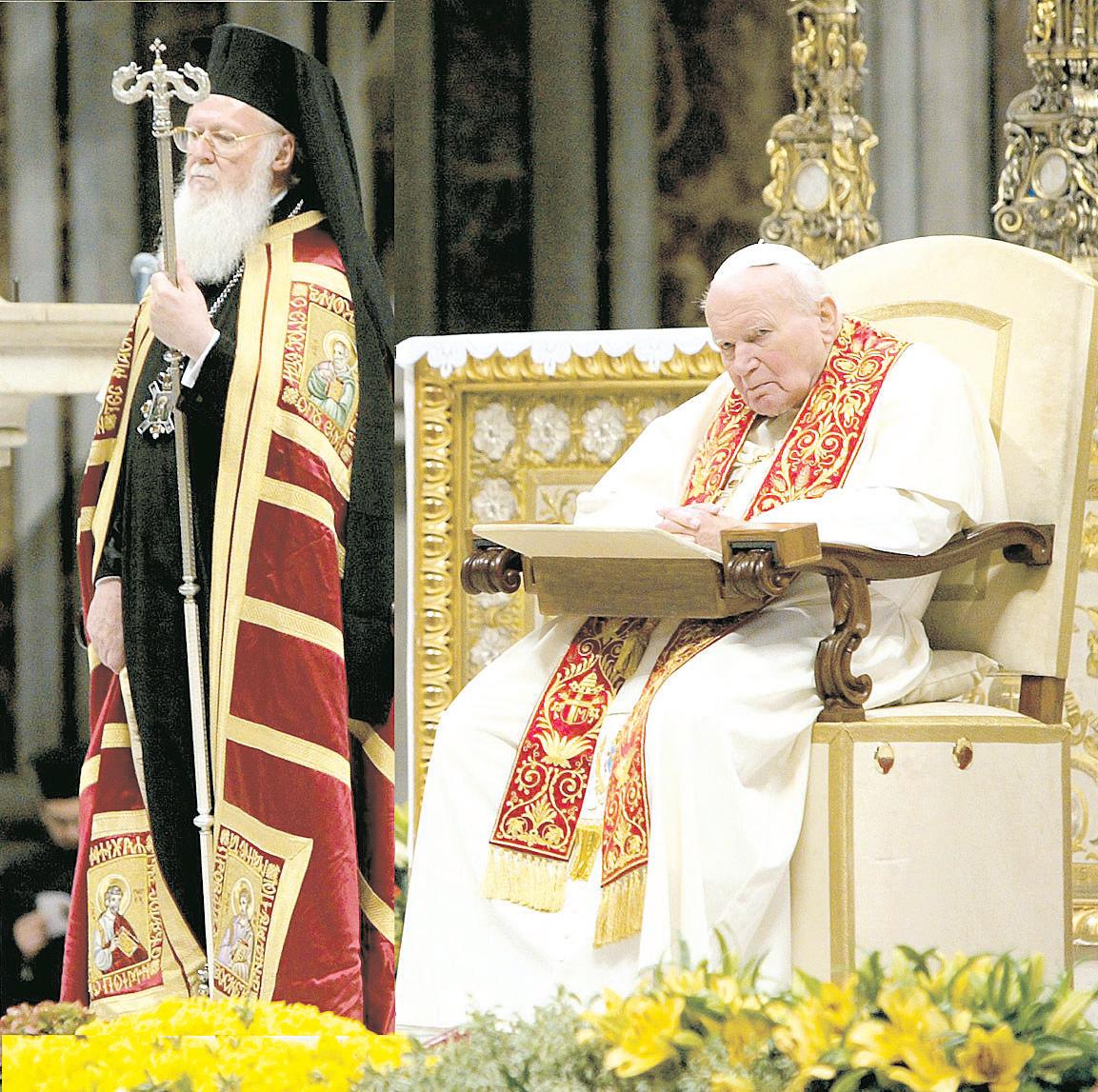
Following the reading of the Pope's message, Patriarch Bartholomew I publicly thanked him, expressing the "happiness and joy" that this gesture causes in the See of Constantinople in Istanbul, Turkey, and in the whole Orthodox community.
"A sacred act is celebrated today, which repairs an ecclesiastical anomaly and injustice," the Patriarch said.
"This fraternal gesture of the Church of ancient Rome confirms that insurmountable prob-
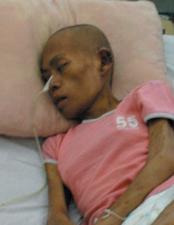
lems do not exist in the Church of Christ, when love, justice and peace meet in the sacred 'diaconia' of reconciliation and unity," the Orthodox leader said. With this act, the Patriarch concluded, the Pope has given "a luminous example that must be imitated."
The relics of St Gregory Nazianzen, who died in 390, arrived in Rome with a group of Byzantine nuns who were fleeing from the iconoclast persecution of the eighth century and in this way saved them. Those of St
John Chrysostom, who died in 407, were probably removed from the historic Church of the Holy Apostles during the Latin empire of Constantinople, which lasted from 1204 to 1258.
Later, in an interview on Vatican radio, Bartholomew I said that receiving the relics of two Doctors of the Church from John Paul II was his most important service in 13 years as ecumenical Patriarch of Constantinople.
The "first among equals" of
Continued - Page 11
More than 700 people turned up to St Mary’s Cathedral last Friday night to witness the ordinations of three more priests for the Perth Archdiocese.
This now brings the total number of ordinations since 1994 to 56.
Fr Thai Vu, from St Charles Seminary, and Fathers Vittorio Riccardi and Miguel Zavarese from the Redemptoris Mater Missionary Seminary, will serve in the Perth Archdiocese.
During his homily for the occasion, Archbishop Hickey spoke about his experience at the recent Bishops congress in Sydney, recalling a conversation he had had with another Bishop earlier that day.
“The Bishop was not looking at the negatives, but at all that he had received to preach to the congregation well,” Archbishop Hickey said.
“The priesthood is a special opportunity not given to everybody,” he added.
“It is not about status or special position, but about being in union with Jesus Christ to preach the good news of salvation and offer the bread of life which is Jesus Christ himself.”
Present at the event were family and friends of Fr Zavarese and Fr Riccardi, who had come from Brazil and Italy especially for the event.
Fr Vu, orginally from Vietnam, was also supported by the presence of his parents, brother and two sisters.
There was also much support from members of the Vietnamese community.
Meet the new priests - Page 11.
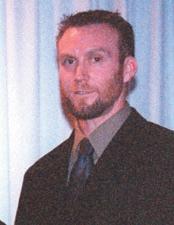
Clare Pike, director of the Respect Life Office, has been appointed to the Australian Catholic Bishops Conference Taskforce to investigate ways to increase financial and human support for those facing the dilemma of abortion.
Archbishop Barry Hickey announced the appointment last Saturday night at the RLO’s first fund-raising dinner dance.
Proceeds from the function, attended by 190 people, will help the RLO to run a course on the Theology of the Body over four weeks in January.
The abortion taskforce was created by the ACBC at its meeting in Sydney last week.
Catholic Bishops propose abortion alternatives
In their statement the Bishop’s said the Church already provides pregnancy counselling, adoption services and other supports through its network of Centacare and associated agencies, but is ready to do more.
“We call on churches, government and charities to join us in ensuring that all pregnant women
have real options” the Bishops said. “We support the establishment of a national forum to consider practical ways of assisting them and of promoting constructive discussion within the community.
“No woman should have to choose between her own wellbeing and the life of her child. The well-being of a pregnant mother and her child cannot be separated. To harm one is always to harm the other; to care for one always requires caring for both. Yet too often women report being pressured by their circumstances into having an abortion: they feel they have no other option.
“Women with unplanned pregnancies need to be offered genuine alternatives to abortion. They need access to good counselling and support, healthcare, welfare and housing. Educational facilities and work places must be more accommodating of the special needs of pregnant women and families.
“The current public debate over abortion has unearthed deep unease amongst ordinary Australians, especially about late-term abor-
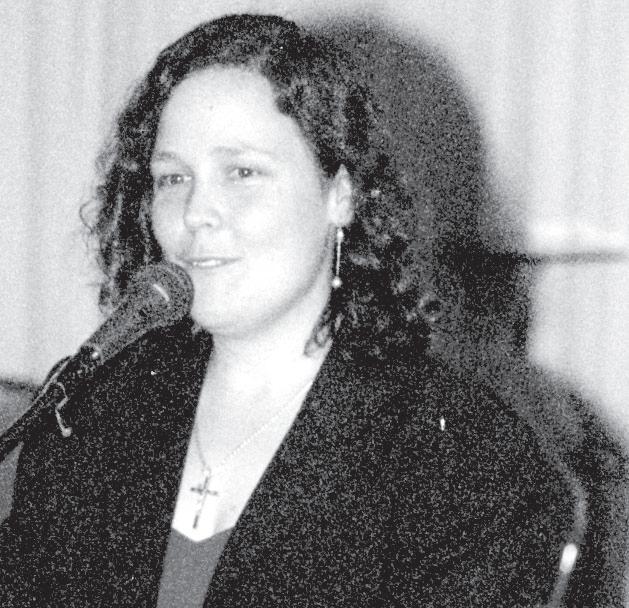
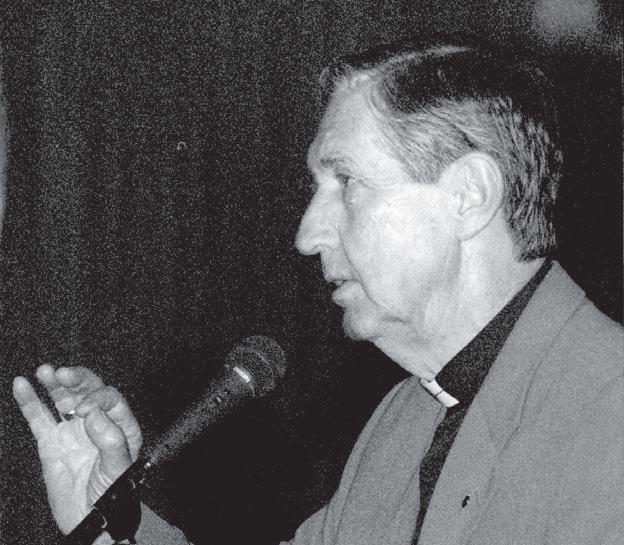
tions. There is an emerging consensus that the annual abortion toll of up to 100,000 is disturbing. The Bishops welcome continued discussion about ways of reversing the spiral of abortion in our country. The Church stands ready to help in shaping a positive new approach to problem pregnancy.
“Catholics join others in



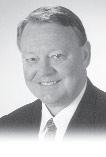
opposing all violence to women and children, before or after birth. Abortion also impacts on fathers, wider networks of family and friends, health professionals, and society as a whole.
“Every human being deserves our reverence and l ove, from the beginning to the end of the continuum of life. All human rights
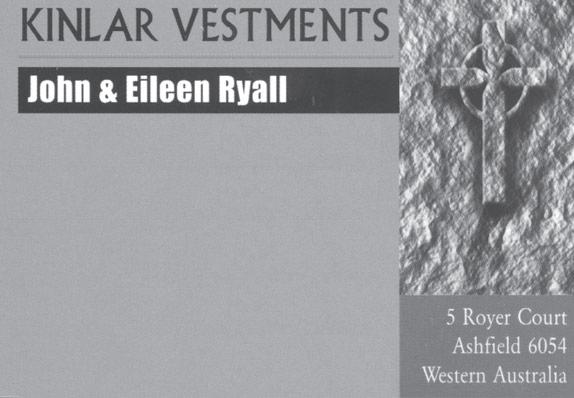
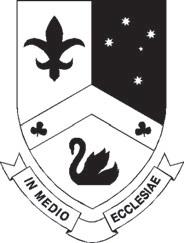
Subscriptions
Kylie Waddell administration@therecord.com.au
PO Box 75 Leederville, WA 6902
Advertising
Eugen Mattes, Carole McMillen advertising@therecord.com.au
PO Box 75 Leederville, WA 6902
The
587
Journalists
Jamie O'Brien jamieob@therecord.com.au
Bronwen Clune clune@therecord.com.au
Mark
ultimately depend upon that recognition.
But respect for human dignity also requires practical support for vulnerable people. We need to build a culture that respects the link between life and love, welcomes and esteems children and families, and supports women in every way.”
The colourful picutre on the front page of The Record last week was provided by Desiree Mallet Photography. The acknowledgement was omitted in error.

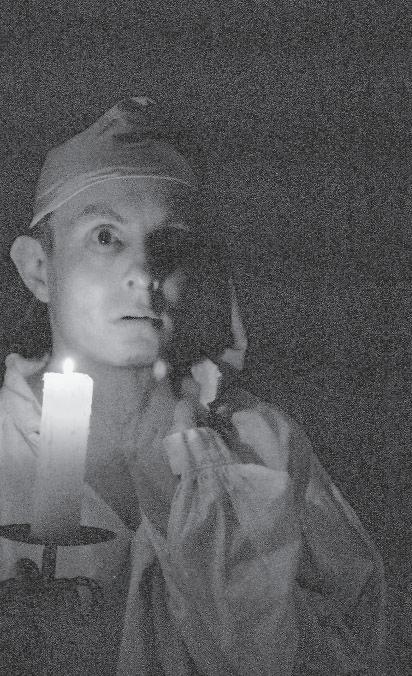
Bunbury Theologian Michael Jackson told more than 50 Manjimup parishioners that to lose hope because of declining Church attendance would be to fail to grasp what God was trying to tell them.
He was speaking in the Pemberton hotel at the last of three meetings at which people from Manjimup, Pemberton and Northcliffe addressed the question of declining religious practice.
Pastoral Associate Sr Pauline Dundon, who with Parish Priest, Fr Pat Rooney, organised the series of meetings, said she believed the informal environment encouraged a communal focus and sharing of the issue as well as nurturing social interaction.
The first two evenings had been introduced by Bunbury Vicar General, Fr Tony Chiera and discussed issues such as the reasons people were drifting away and what changes could be made to rectify the pattern. Practical initiatives
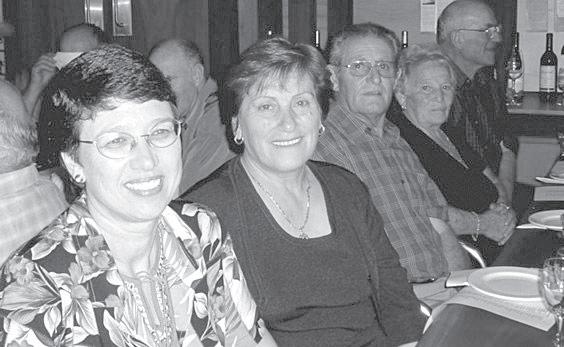
such as the further development of the ministry of hospitality, a series of Home Masses, faith education groups and an encouragement for lapsed Catholics to, “Come Home for Christmas”, were a part of the many options explored.
Dr Jackson’s focus on the final evening was to exhort the faith-
ful to be encouraged despite the declining numbers. He said that to lose hope would be to fail to grasp what God was trying to tell them, both about the mystery and the true nature of the Church, and about how important they are to achieving His plan for the world.
He gave numerous examples
from the Old Testament where God’s strategy was to choose a remnant and use them as an instrument for the salvation of others, culminating in the life of Jesus who ensured that every individual, without exception, is offered this grace.
He said that parishes needed to be living examples of this grace so that people looking in from the outside would be able to witness it and subsequently recognize it working in their own lives. Over food and drink parishioners discussed in small groups ways in which they could more effectively reflect this grace, both spiritually and practically and then shared these ideas with the larger body.
They were reminded of Bishop Holohan’s Pastoral letters, which emphasised that all evangelisation and attempts to bring people back to the Church must begin with one’s own conversion.
Dr Jackson told the audience that God was counting on them as individuals and as a parish community, to be ambassadors of the attractiveness of Christ and
His Gospel and to reflect these in observable ways. He said that if they wanted people to believe in Christ as Redeemer, then they themselves, “have to look a bit more redeemed - more alive, more lovingly inclusive, more ready to put ourselves out for the poor and needy, and more able to give thanks in joy and praise for each and every day.”
At the conclusion of the session Jackson led participants through a Reflection entitled, “The Role of our Humanity in Christian Life and Loving”, in which each person was exhorted to truly look, listen and speak with one another through the heart of Christ.
In order to do this, he said, it was essential that a parish was motivated by the understanding that as God came to humanity in the form of Jesus they must in turn, offer their humanity to God and then within this humanity love and serve one another.
It was only in this way that others would be drawn to the Body of Christ.
“The Records” have been tumbling at the Sacred Heart Church in Pemberton since parishioners Jack Bendotti and Pat Anthony started taking affirmative action.
About five years ago Jack became per-
turbed by the fact that many copies of “The Record” were left behind when the Church doors closed and decided that something needed to be done. Realising that in the social whirl that occurred outside the church after Mass parishioners were often so distracted interacting with others or chasing
children or needing to rush home that they unwittingly overlooked “The Record” which sat on a table out of sight. “There used to be only a half a dozen copies sold when this happened”, Pat said, “so we took the initiative and started to distribute the newspaper ourselves”. Now rarely a week goes by when all 25 copies haven’t been sold. Pat believes
that it is important that Catholics receive an alternative to the secular Press and keep themselves updated on local, national and international issues concerning the Church. Mr Anthony believes that this proactive approach could be successfully adopted in other Parishes if a handful of parishioners were willing to make a small commitment.
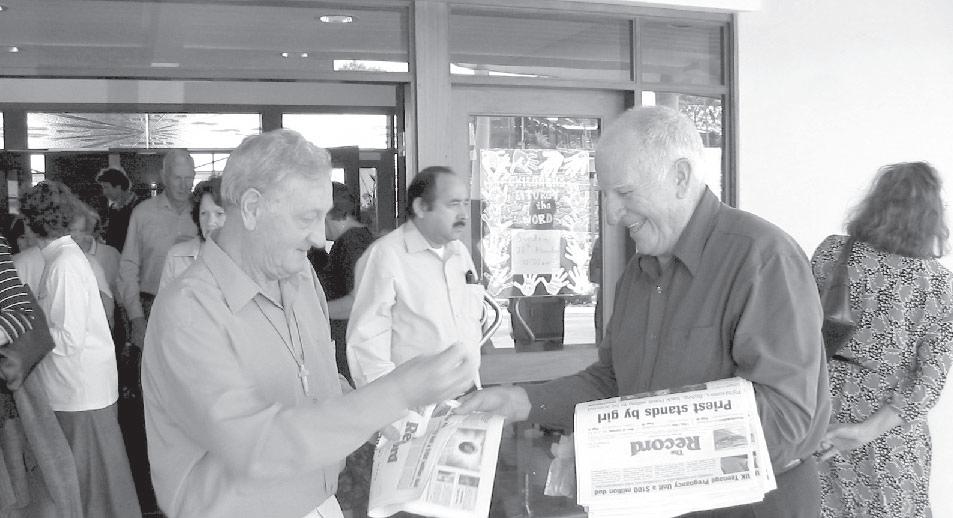
$500,000
State President Brian Bull said that monetary donations are particularly helpful, as St Vinnies can stretch each dollar further by purchasing food and other essential items and they
“We are hoping to raise enough funds to provide assistance right through to May next year and with the help of the community we can make a wish come true,” said Mr Bull.
“Businesses have been particularly helpful collecting gifts to be distributed to those in need this Christmas, but further support is needed by way of cash donations to ensure vital services continue,” he added. To make a donation to the St Vinnies Christmas Appeal call 9475 5416 today or visit the website www.svdpwa.org.au.
American Franciscan priest Fr Justin Belitz will return to WA early next year to present week-long Missions for the Cathedral Parish in Bunbury and the Carmelite Parish of the Infant Jesus in Morley. He will also conduct a one-day follow up to an earlier Mission at St Francis Xavier parish in Armadale and a weekend retreat at Peace Be Still in Chittering.
A writer and teacher of international repute, Fr Belitz has been visiting WA over a period of about 20 years to present a variety of
workshops, seminars and missions.
The integration of body, mind and spirit in the context of the Catholic faith is the central feature of Fr Justin’s presentations. He leads people to a lucid and practical understanding of how the human system works, particularly the connections between mind and body in daily life and health.
He uses meditation and prayer to teach people to turn quietly inward to become more aware of themselves and their relationship with others and with God.
The natural peace of meditation is used as an antidote to the stress of life. It is an aid to health
and healing and enables people to become more aware of the presence of God within them. It makes love-filled living a more realistic goal in daily life.
The Bunbury and Morley Missions will be based on the principles described in Fr Justin’s book “Success – Full Living”. He chose the title because he believes we must again learn to live our humanity fully if we are to live the life God offers us.
His program in
WA will be:
Bunbury: Success – Full Living. St Mary’s Church and hall February
19-25. Fr Justin will preach at Parish Masses on February 19-20.
From February 21-25 he will say Mass at 9am and conduct sessions from 9.45 to 10.45am and from 7.30 to 8.30pm. Contact St Patrick’s Cathedral parish, Dick on 9721 4651 or 0419 336 389.
Morley: Same program as Bunbury on March 5-6 and 6-10.
Contact, parish 9276 8500.
Armadale: Follow-up morning and evening sessions March 16.
Contact, parish 9399 2143.
Chittering: Live-in retreat March
18-20, or one-day retreat March 19.
Contact Wendy 9571 8108
The University of Notre Dame Australia is entering into a partnership with Stella Maris College in Manly, Sydney. The Principal and members of the board met with the Vice Chancellor, Dr Peter Tannock, and the Executive Director of the Sydney Campus, Peter Glasson, to formalise the partnership and to sign the agreement.
Through the agreement, Stella Maris will offer a foundation studies program for international students who are keen to study at Notre Dame. Students who successfully complete the foundation program will be eligible to apply for positions at the new Sydney campus.
“The program will be helpful in establishing Notre Dame in Sydney and it will also assist in the development of Stella Maris College’s special-

ist English course”, said Mr Glasson. Notre Dame is Australia’s only private Catholic University. The Sydney campus will offer courses in Nursing, Teaching,
Law, Commerce and the Arts in 2006. A graduate entry Medical Degree will also be offered in 2007 subject to accreditation by the Australian Medical Council.
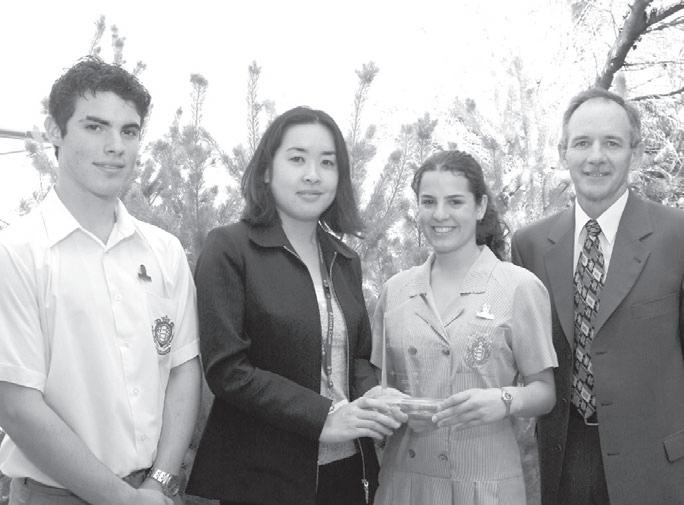 ■ By Phil Bayne
■ By Phil Bayne
A passion for helping the less fortunate in society has earned Sacred Heart College the ‘Young People Who Care 2004 ‘Caring Together Award’ from Silver Chain and Carers WA.
Young People Who Care is an award program open to youth aged 12 - 18 years who provide voluntary care to others.
The Caring Together award recognises the collective contributions of the College students and staff.
Every year, the College involves itself in a number of fundraising and awareness programs, both locally and abroad.
Each year group is allocated a specific organisation to raise funds for, and in 2003, a total of $27,000 was raised.
As the 2004 school year draws to a close, the total amount of money raised has already doubled that of 2003, with the Vietnam Appeal alone raising $25,000. More than 12 organisations have been the recipients of assistance from the College in 2004 including, LifeLink, St Vincent De Paul and Caritas.
St Kieran’s Parish in Osborne Park re-opened their extensively refurbished Parish Community Centre last Sunday November 28. Built in 1914, the building, on Waterloo Street Tuart Hill, was originally used as a Church, but was converted to a Community centre in 1988.
Parish priest Fr Michael Gatt
said the building is valued for its strong religious associations as a well-loved parish church, which served the people of Osborne Park and surrounding districts from 1914 to 1983.
“It is a landmark for all to see and is listed with the City of Stirling Municipal Inventory,” he said.
A new church building was completed in 1983 and opened by Archbishop Goody.
Many items, such as the tabernacle, pulpit, baptismal font and some statues from the original church were re-located to the new church.
The Community Centre was also used as a school
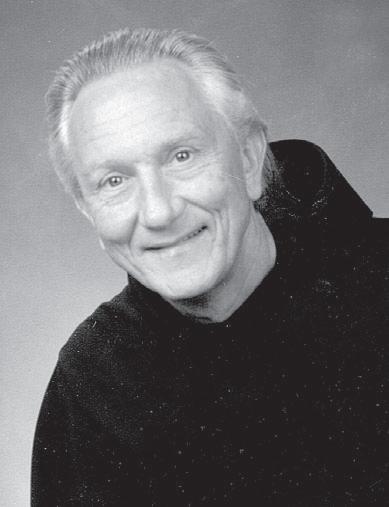
The recent announcement by the Minister for Justice of an investigation into the provision of custodial services and facilities in the Kimberley Region has been welcomed by the Diocesan Office of Justice, Ecology & Peace in Broome.
The Coordinator of the Office, Br Shane Wood said that this was long overdue.
“Much of the overcrowding..... is caused not just by inadequate facilities, but by the incarceration of people who should never be there in the first place ...”
“It is pleasing to note that this is going to involve not only professional people in the justice system, like Professor Harding, but also local people who have a vested interest in the provision of more adequate and culturally appropriate facilities and processes for those who get caught up in the justice system,” Br Wood said. “We know of course that by far the largest group represented in the justice system are indigenous people. This in itself is a cause for concern and needs to be a part of some further investigation. It is one thing to be instigating this Task Force under the banner of law and order and keeping the community safe. This is a politically expedient thing to be raising just prior to an election. It is another to be proactive in the broader community to try to prevent so many of these people ever coming into the justice system in the first place.
“Much of the overcrowding in the Broome Prison is caused not just by inadequate facilities, but by the incarceration of people who should never be there in the first place – minor offenders and fine defaulters. These matters need to be addressed as well.
“This Office endorses the work of the Task Force, but hopes that more will also be done to address the concerns raised by the Deaths in Custody Enquiry and by the over representation of Aboriginal people in the justice system,” Br Wood concluded.
The 90-year-old building is well used by the community and its renovation was sponsored by the Heritage Council and Lotterywest.
The refurbishment includes, a roof replacement, repairs to the external brick walls, soak wells and internal improvements.
“The Centre has a very impres-
sive finish and it has been predicted to last another 90 years,” Fr Gatt said.
The official re-opening ceremony was conducted by Bishop Don Sproxton in the presence of Minister John Kobelke and the Mayor of the City of Stirling Tony Vallelonga among other distinguished guests.
With Pope John Paul having announced the Year of the Eucharist, Flame Ministries International have organised a number of keynote speakers for the 15th Annual Flame Congress, January 28 to 30, Bread from Heaven.
Catholic apologist and founder of St Gabriel Communications Raymond de Souza, director of the Cathedral Choir Fr Timothy Deeter and FMI Director, author and Catholic Evangelist Eddie Russell will deliver talks.
Bishop Don Sproxton will conduct the opening session, “Why the Eucharist is the Source and Summit of our Faith”, which is open for all. Catholic Youth Ministry Director Fr Don Kettle will be the main celebrant for Mass and adoration on the Sunday morning. Fr Deeter said the talks will center on the relationship the Eucharist
has with our own life and the scriptures.
“We need to remind ourselves what the Eucharist really is and why we should appreciate it as the centre of our Catholic faith,” he said.
Fr Deeter will present four of the 11 talks.
“The last 10 years has seen a renewed interest in Eucharistic devotion, especially with many places sponsoring Eucharistic adoration,” he said. “Despite this however, many Catholics, young and old, are still at a loss to explain what the Eucharist really is.”
Fr Deeter said that people can say the Eucharist is the body and blood of Christ, but perhaps the scriptural and historical basis for this belief does not come quickly to mind.
“I think that the various talks
at this weekend are intended to refresh our memory and inspire our souls as we seek to grow in love for our Eucharistic Lord.”
Mr Russell said that healing related to the Eucharist is an aspect little understood.
“St Paul connects proclaiming the death of Christ and discerning the body and blood with physical health and life.”
“When understood we can expect this to take affect in some manner at Holy Communion, so we will also have prayer ministry for the sick during the Congress.”
The Congress will be held at the All Saints Chapel, Allendale Square commencing at 7.30pm on Friday January 28.
Enquiries can be made to Linda at Flame Ministries International on 9382 3668 and by email, fmi@flameministries.org.
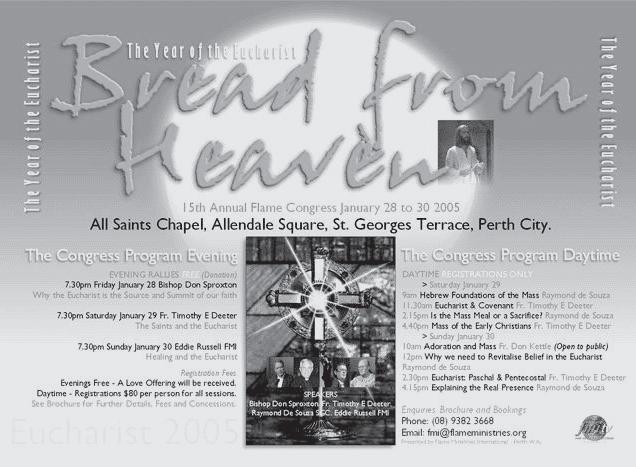
East Timorese cook Ermelinda works six days a week, barely earning enough money to support her seven children. She is one of the lucky ones in a country where about 80 per cent of the population is unemployed and only fifteen per cent have access to clean water.
Sr Rosemary Patterson, East Timor mission co-ordinator for the Carmelite Friars, lived in East Timor for three years from 2000 to 2003 where she met Ermelinda. Sr Rosemary said “Ermelinda wove baskets and placemats when she was not working as a cook to finance an education for her children. She fights the battle against poverty and ignorance by providing her children with a means to a better future.”
The Australian Carmelites have been working in East Timor since 2001, after the August 1999 vote for independence from Indonesia. Like a struggling child learning to walk, the world’s newest country, Timor Leste (East Timor) celebrated its second birthday in May 2004.
Australia has played an integral role in helping the world’s newest democracy survive after the trauma of its occupation by Indonesia and its tumultuous birth as an
independent nation, during which 85 per cent of the East Timorese infrastructure was destroyed.
Australian community organisations have been extremely effective in helping East Timorese communities towards independence. But, there is still a long way to go, especially in remote rural regions, such as Zumalai near the Indonesian border.
Zumalai lies a bone jarring seven-hour road journey over mountainous terrain from Dili, the nation’s capital. Here, the ravages of the independence conflict with Indonesia and the dire poverty of the rural community combine to create appalling conditions. It is in the Zumalai region that the Carmelites are working to help rebuild communities and establish basic infrastructure, health and education programs.
In Zumalai, the Carmelites have established a workshop to train men in engine maintenance and woodwork, run weekly youth activities and assist with the mobile health clinics run by the Carmelite sisters, who treat mostly women and children suffering diseases including malaria and tuberculosis.
Pre-pay your funeral with an Oakwood Guardian Plan and secure your family’s peace of mind. Guaranteed.
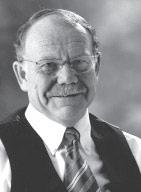
Using Oakwood Funerals’ Guardian Plan to pre–arrange your funeral frees your family from worry at the one time they can least afford to worry. It also means your wishes are carried out to a T. And, because the Guardian Plan is a nationally accredited funeral fund, you are guaranteed that the cost of your funeral is fully covered and will never go up–whether it occurs a week or decades after you make the arrangements. Now that’s peace of mind. Ask for an obligation-free information kit today. Complete the details in the space provided and mail it; or, if you prefer, call into one of our Funeral Homes or phone our head office on 9330 8300.
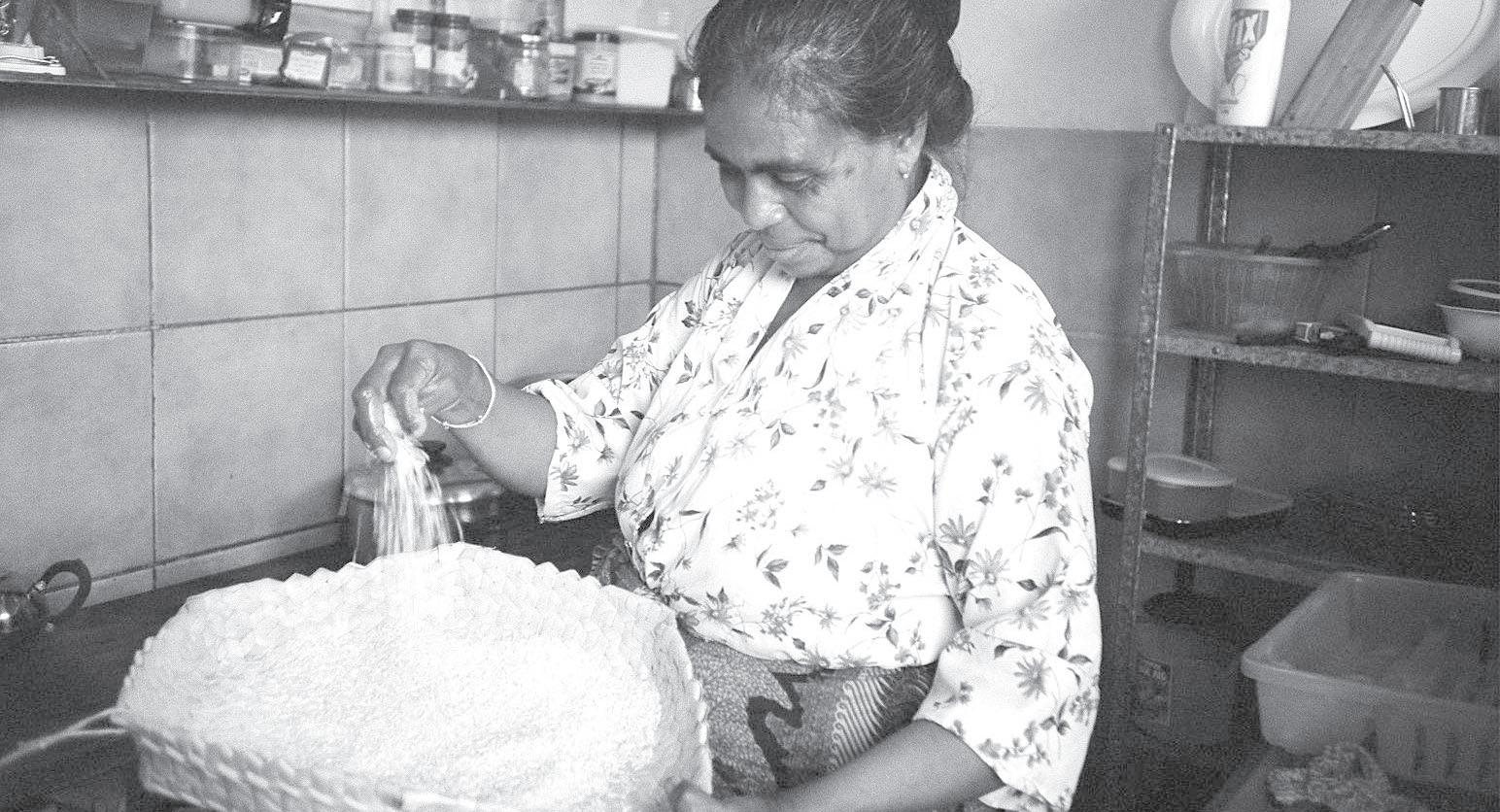
Ermelinda works six days a week to support her children and is one of the lucky ones.
The Carmelite Superior of East Timor, Fr Ipong, said the people of Zumalai are poor farmers and little aid gets to this remote region, . “Around some villages, the gras is more than two metres high and during the dry season the soil is like stone” Father Ipong said. “Crocodiles hide in the long
grass near the river. The people urgently need help to grow food crops because most of the people do not have enough to eat.”
The mortality rate is 200 times higher than Australia.
Life in East Timor is a daily struggle, and to support their work the Carmelites Friars have pro-
duced a calendar to raise awareness and funds for their projects in East Timor. Ermelinda features on the cover of the 2005 East Timor calendar along with other photographs which depict the country and its people. The calendar sells for $10 and can be purchased by phoning 03 9690 8822.
The Order of Carmelites, after forty-eight years service, will be withdrawing their presence from Our Lady of Carmel Parish in Hilton at the end of January.
In a letter handed to all parishioners the Australian Prior Provincial, Fr Wayne Stanhope announced that this decision was made, “….with deep sadness, after much reflection and serious consideration.”
The letter explained that the Carmelite Order across Australia was already overstretched due to having no ordinations in the past twenty years. He pointed out that the Carmelites would also be withdrawing from two parish communities in Melbourne in October.
The attention of these Carmelites will now be focused on mentoring and supporting thirty- seven young men in training in East Timor.
Fr. Wayne thanked the parish for the faith in their pastoral leadership and assured them of the prayers of each member of the Carmel Province.
“I ask from you a freedom of heart to let go what has been”, he said, ”and embrace with hope and joy what lies ahead”.
The Weekend Australian hit the bottom of its own barrel in its Magazine last weekend. There, it found John Cornwell and its own religious prejudice in an article about the Pope that borders on insanity. For some years, Cornwell’s problems have been conspicuous in his writing, but The Australian has no excuse either for publishing his rubbish or for the headlines it attached to it. The front cover declared: “How sex brought the Pope undone.” One can only ask, when was the Pope brought undone? Why was it not reported on the front page of the paper?
Inside, the headline is, “The Prudish Pontiff”. Only a real prude (or someone sicker) could imagine this remarkably powerful man as a prude. Along with the heading runs the question “Did dark secrets in his early life shape the sexual puritanism of Pope John Paul II?” There are no secrets, dark or otherwise, revealed in this article, but that does not stop The Australian using them to present ‘sexual puritanism’ as though it were a fact.
Let us now turn to the contents of the article. There are so many lies, distortions, misrepresentations, selective quotes and stupid reasoning that it is impossible to deal here with even a small part of them, so we will concentrate on the central theme of the article.
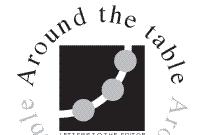

Iwould like to take issue with
John Angus who objected to your heading “Gays muscle in on Communion”.
The homosexual community has skillfully manipulated the English language, as has the pro-abortion camp, to cover the real meaning behind words.
The Record’s Vista pages on the Culture of Death (25 November) were particularly informative. The survey of the degeneration of Western philosophy merits very serious consideration because what people think is critically important and it is a deplorable fact that the most potent influences on contemporary attitudes have been viciously antichristian philosophies.
The evil source of these philosophies becomes apparent when perceived from the perspective of Marian revelations.
In 1846 at La Sallette, Our Lady warned that in 1864 there would be an upsurge of evil. “Lucifer and many demons will be unloosed from Hell; they will put an end to faith gradually, even in those dedicated to God; several religious institutions will lose all faith and will lose many souls.... Evil books will be abundant on earth and the spirits of darkness will spread everywhere a universal slackening of all that concerns the service of God.” The 1860s witnessed an upsurge of Gnostic spiritualism but the most significant book of that decade was published in France in 1863. It categorically denied the divinity of Christ. The German edition of Ernest Renan’s “Vie de Jesus” was published in 1864 and was very favourably received in Protestant Germany, especially at the theological faculty of Tubingen University, which developed the so-called Higher Criticism of the Bible.
PO Box 75, Leederville, WA 6902
Tel: (08) 9227 7080, Fax: (08) 9227 7087
cathrec@iinet.net.au
This theme is John Cornwell’s obsession with the debasement of human sexuality that is so characteristic of our times. Cornwell pretends that the Pope is obsessed with sex, but in truth Cornwell is the man with the problem. He is so angry and frustrated that the Pope and the Church will not accept the world’s devotion to fornication, adultery, contraception, divorce, abortion, homosexual behaviour, and the illnesses that result from these things that he allows his problem to lead him into remarkably stupid arguments.
First, he pretends that Catholic sexual teaching is the Pope’s. In fact, the teaching is the Church’s teaching and has been since long before Karol Wojtyla was born and will be long after he has gone to join the rest of the saints in heaven.
Next he claims that the Pope’s fidelity to the Church’s teaching “has resulted in” … about 80% of Catholics in the developed world using contraception and 40 per cent of Catholic marriages ending in divorce. There is a grain of truth in this: Catholics who abandon the Church’s teaching and practise contraception have about the same divorce rate as the rest of the community. But how is this the Pope’s fault? Would any of it change if the Pope abandoned the Church’s well reasoned understanding of human nature? Would the divorces stop? And then there is the little matter that Cornwell is too terrified to even think about: Among Catholics who are faithful to the Church’s teaching and, if necessary, practise natural family planning, the divorce rate is almost non-existent.
Later, Cornwell tell us: “His failure to allow the use of condoms … has condemned millions to unnecessary death.” This is farcical. Does Cornwell imagine that people who utterly ignore the Church’s teachings on promiscuity, prostitution and sodomy suddenly say “Oh, I can’t use a condom, the Pope wouldn’t like it!” Grow up, man. Nobody has ever died of AIDS or any other sexually transmitted disease because they followed Catholic moral teaching.
But Cornwell gets worse. He says the Pope’s denunciation of (socalled) safe-sex has cost him his moral authority in other areas:
. embryonic stem-cell research. Sure thing, John. Those moneyhungry bio-tech companies who are eager to destroy human embryos would give it all up if only the Pope would preach safe-sex!
. the just war debate. Why didn’t we think of it before. George W. and the Coalition of the Willing would have stayed home curled up by the fire if only the Pope would distribute condoms wherever he goes.
. a disastrous loss of influence over the excesses of Islamic fundamentalism.(It’s true. He really said that.) Naturally, Osama bin Laden and all his ilk would retire to quiet country retreats, never again to harm so much as a rat, if only the Pope would speak in favour of adultery, abortion and sodomy. Cornwell’s final inducement to the Pope comes in his final sentence and implies that if he were to mend his ways he could correct “his failure to lead all the religions of the book – Judaism, Christianity and Islam – away from dogmatic fundamentalism….” Where have we heard that temptation before?
The devil took Jesus to the top of a high mountain, showed him all the kingdoms of the world, and said he could have them all if he would fall down and worship him.(Lk 4:5-7).
Today, we have John Cornwell and The Australian telling the Pope that if only he will fall down and worship sexual perversion, he can have control of all the religions of the world. Let us thank the Lord our God for such a wise Pope who, even in the frailty of his illness, can resist the pressures of the devil and his minions.
God destroyed the town of Sodom because the perverted sexual activities of its inhabitants were so abhorrent to Him. Such activity has been known as sodomy ever since.
It is no sin to be a homosexual, just as it is no sin to be a heterosexual. Sodomy and adultery are both grievous sins. Anyone dying unrepentant, in such states of sin will go to Hell.
The reception of Holy Communion in such states, compound the sinfulness and is called Sacrilege. See 1Corr: vs27-28.
Canon 915 says “…those who obstinately persist in manifest grave sin, are not to be admitted to Holy Communion”.
As I understand it, the wearing of a rainbow sash is an outward sign of the unrepented sin of sodomy by the wearer. It is an open challenge to the law of God. It does not merely represent the sexual tendencies of the wearer. I would certainly follow the lead of George Cardinal Pell in this matter and refuse Communion to anyone who came to me for the Sacrament wearing this sash. To do otherwise would involve me in their intended sacrilege and I would certainly have to answer to Almighty God for it.
Hating sodomy is quite different from hating such a sinner. The homosexual community vociferously proclaims that there is no difference and has coined the word homophobia to cover up the clear distinction between the two hates.
I am sure that John Angus has often heard it said that we should hate the sin and love the sinner. He chooses to ignore this and accuses those who don’t of hating both. In so doing he follows the path of obfuscation so beloved by the homosexual community.
John Rayner HillarysAs Richard Noll, the author of “The Jung Cult” has written: “The search for the historical Jesus proved to be the turning point for nineteenth-century critical theology and European culture as a whole, for by the end of the century, widespread skepticism about the divinity of Jesus and the truth of the Gospels opened the way for social experimentation with other religious, neopagan occultist or atheistic life-styles. These new paths of social action in Europe were, in part, the result of the intellectual climate created by the widely disseminated researches of German critical theologians.”
On the 16th April 1917, Lenin arrived at Petrograd (Leningrad) and demanded an uncompromisingly violent revolution. An eyewitness has described the effect of his speech. “It seemed as though all the elements had risen from their abodes and the spirit of universal destruction was hovering round the reception-room above the heads of the bewitched disciples.”
God’s response to the spirit of universal destruction was revealed at Fatima. From May to October 1917 the spiritual counter-attack was proclaimed. First and foremost came the command to pray. A lovely Lady, “more brilliant than the sun” told three innocent children to say the rosary every day.
The following month Our Lady instructed the children and to add a new prayer to the rosary: “O my Jesus, forgive us our sins, save us from the fires of Hell and lead all souls to Heaven, especially those who have most need of Thy mercy.” Our Lady promised salvation to those who were devoted to her Immaculate Heart. “My Immaculate Heart will be your refuge and the way that will lead you to God.”
In July came the warning: „God is going to punish the world for its crimes by means of war, hunger, and persecution of the Church.‰ Our Lady asked for the consecration of Russia to her Immaculate Heart and warned of the dire consequences it this request was not fulfilled.
In the final Fatima apparition, Mary was revealed as the Apocalyptic “Woman Clothed with the Sun” and acknowledged as such in the 1967 encyclical Signum Magnus.
In November 1917 the Bolshevik Revolution began and Russia became a Communist dictatorship until 1989. The eventual collapse of the Russian empire was hailed as the dawn of a “New World Order” - which can now be seen as an utter delusion. The work of false philosophy and faithless theology is as dangerously destructive to our civilization as Communism, because it is inspired by the same spirit of universal destruction.
I believe the most effective way for the Church to counteract that destructive spirit is to pay diligent heed to the messages of Fatima. St Paul warns the Church that we are not at war against flesh and blood, but against “the sovereignties and powers who originate the darkness in this world; the spiritual army of evil.” (Ephesians 6:12)
I would also commend the profound value of meditative and contemplative prayer, as indicated in The Record‚s book reviews (25 November) and the very sound advice in the editorial, concerning unconditional submission to the will of God.
Hugh Clift Lesmurdie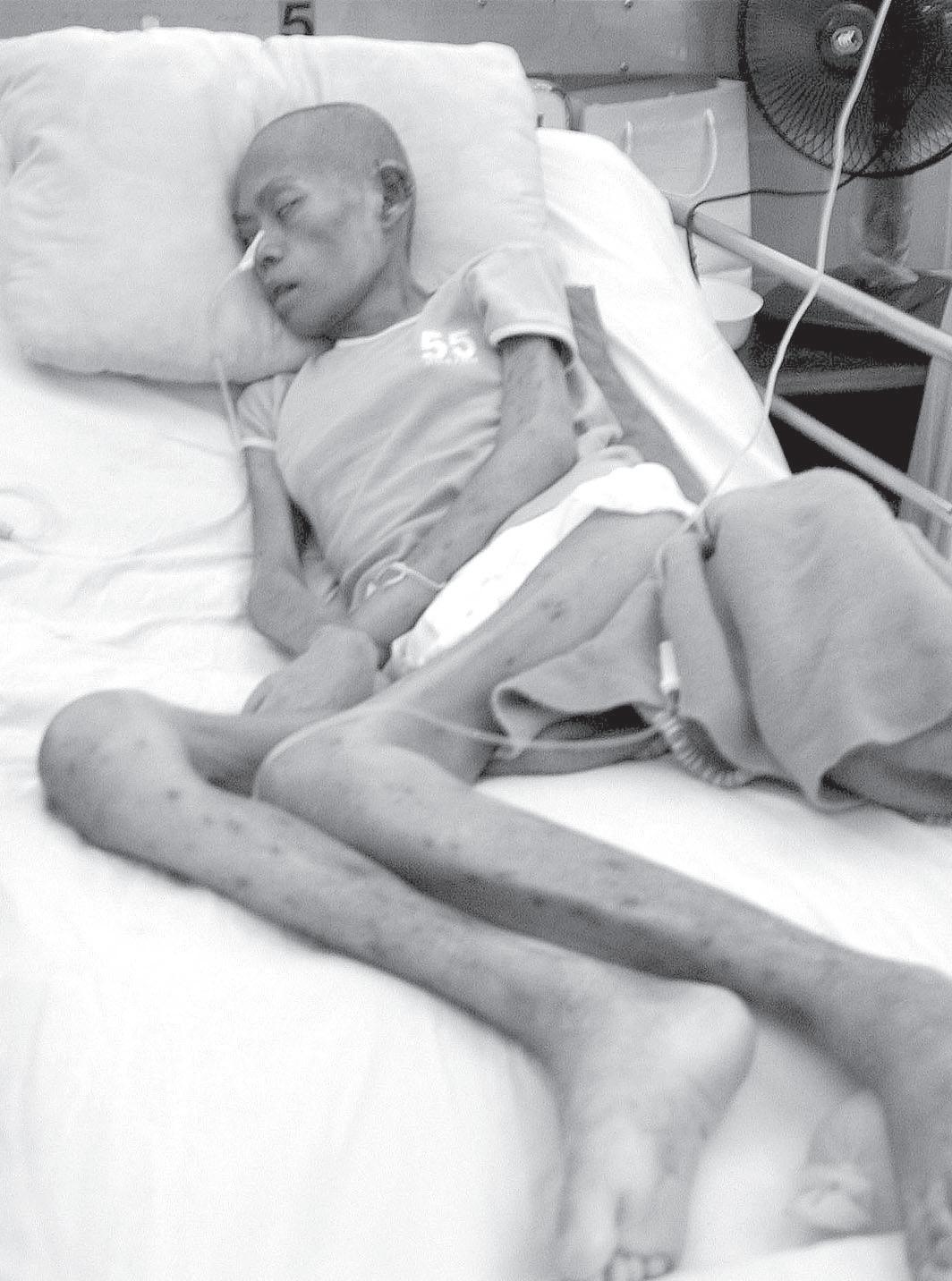
December 1 was World AIDS day. The special day initiated by the Joint UN Program on HIV/AIDS focuses this year on how the disease is striking an ever greater proportion of women and girls and the effect this has on families, children and society.
“The more this infection advances among women, who are the pillars of families and communities, the more the danger of social breakdown increases,” Cardinal Javier Lozano Barragan, head of the Pontifical Council for Health Care Workers said.
Since the start of the epidemic in the 1980s, more than 22 million people have died from AIDS. Currently, 42 million live with the HIV/AIDS virus, one of the greatest health challenges at the world level. In 2003 some 2.9 million people died of AIDS and 4.8 million were infected with HIV. AIDS is the main cause of death in the 15-49 age bracket. In Africa, especially, the AIDS epidemic has spread fast. By 2025, AIDS is expected to be the cause of death of 31 million in India and 18 million in China.
“The situation for children is dramatic,” Cardinal Barragan said in the message. The number of AIDS orphans increased from 11.5 million in 2001 to 15 million in 2003, he said. The majority of these are in Africa.
The welcoming fabric of sub-Saharan African societies is falling apart, he said, because there are too many orphans for already poor families to absorb.
AIDS victims should not be stigmatized, Cardinal Lozano said. A great number of churches, religious institutions and lay associations already care for them “with love, a sense of responsibility and a spirit of charity.” Nearly 27 percent of AIDS care centres are Catholic, he said.
Cardinal Lozano proposed substantial reductions in the price of the antiretroviral drugs used to treat HIV/ AIDS, now largely too expensive for poor nations to buy in the necessary quantities; increased information about the disease and its prevention, particularly to stem the cases of infected pregnant mothers passing HIV to their babies; more help from developed countries “in a way that avoids all forms of colonialism”; and a greater effort to educate young people about chastity, fidelity and sexually responsible behaviour.
In sub-Saharan Africa, where AIDS has hit hardest, close to 60 percent of adults living with HIV are women, said a report published on November 23 by UNAIDS and the World Health Organisation.
Throughout the world, the report said, the number of women affected has risen in the last two years, with the greatest increase in East Asia.
In sub-Saharan Africa, where AIDS has hit hardest, close to 60 percent of adults living with HIV are women.
The Camillian Social Centre in Rayong receives at least 200 donations a month - cheques sent from across the country.
But the AIDS hospice that now cares for more than 100 patients has been the target of three attacks - including a bomb attack in 1995 for “harbouring” AIDS patients considered criminals by other Thais.
“We are glad that gradually the attitude to AIDS is changing. There is certainly greater social acceptance and understanding (toward AIDS),” said Camillian Father Giovanni Contarin, founding director of the centre.
“There was a time when local people objected to our people walking in the street or going to the market,” said Father Contarin, an Italian who heads the Catholic Committee on AIDS under the auspices of the Thai bishops’ conference.
“But now, even local people are coming to help us as volunteers and serve our residents,” said Father Contarin, who said the Church was leading the way in AIDS awareness and prevention.
Sunanta Wannam, who has been working in the centre’s AIDS prevention department since 1997, acknowledges that people now are “less scared” of AIDS than when she started.
“They are now more open and ready to listen,” said Wannam, who visits offices, factories, schools and markets to spread awareness of the disease.
The centre’s AIDS prevention team organises at least 15 AIDS awareness training programs a month for volunteers and others in Thailand’s eastern province.
The region has the highest HIV infection rate in Thailand due to the migrant labour force in the industrial belt and tourist resorts that thrive on sex tourism.
Thailand, with a population of 63 million, had the highest HIV infection rate in Asia when the Church took the lead in educating Thai society on HIV prevention without advocating condom use.
AIDS has claimed nearly 1 million lives in Thailand and left behind more than 300,000 HIV orphans. At the pandemic’s height in the 1990s, 150,000 new HIV infections were reported every year.
Now, with the help of the Catholic Church, which operates 29 AIDS centres across the country, Thailand’s HIV infection rate is estimated by the government to be at 20,000 a year.
The Catholic Committee on AIDS coordinates the work of the Catholic organisations engaged in AIDS-related activities, from care of neglected HIV victims to spreading awareness of prevention.
“Our AIDS education program is not confined to these 29 centres alone. All the Catholic institutions and network are somehow involved in the fight against AIDS,” said Usanee Nanasilp, committee coordinator.
All 10 Thai dioceses have working groups that “monitor, evaluate and improve” the work of local Catholic AIDS initiatives “and
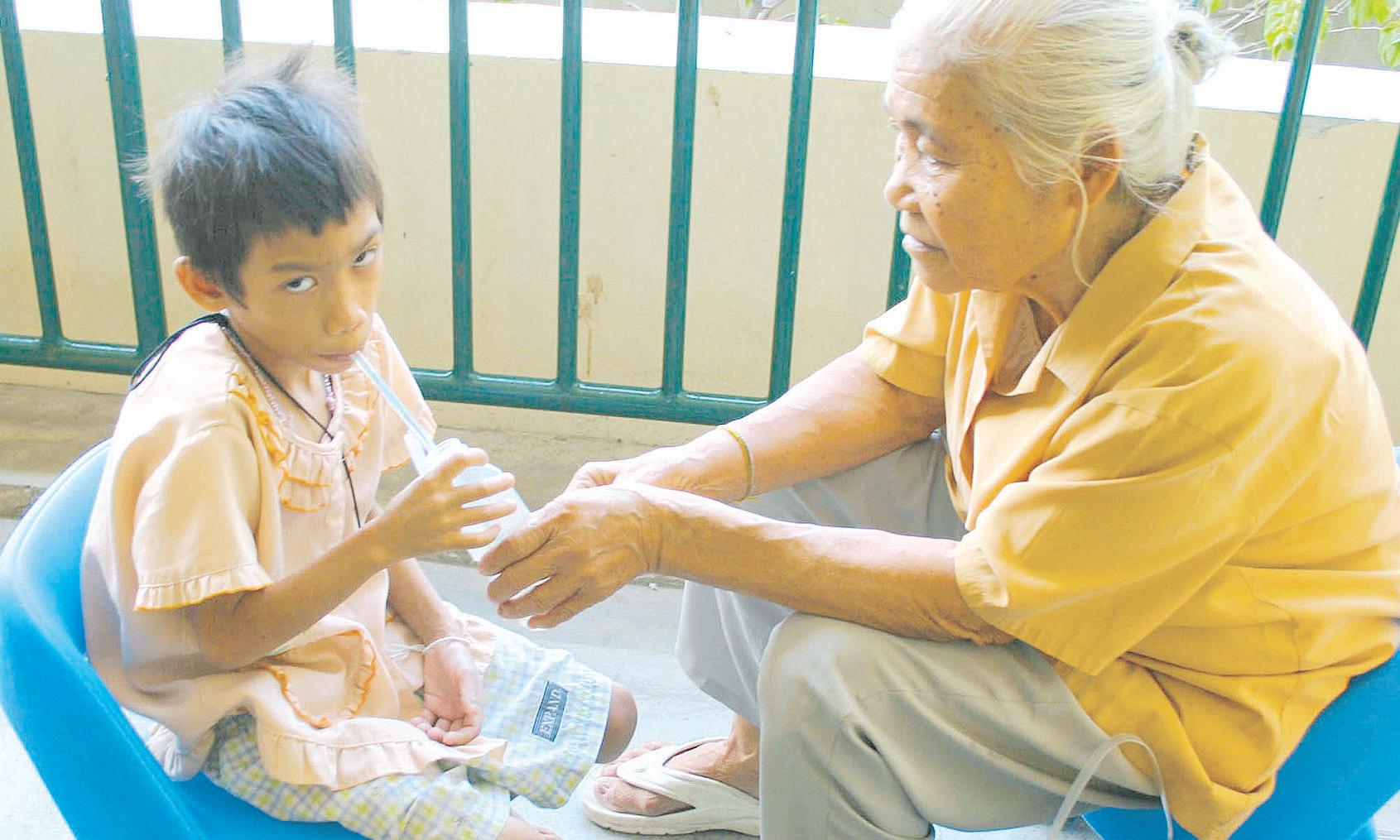
efficiently provide care to affected people,” Nanasilp said.
The groups were established in response to the Thai bishops’ pastoral plan for 20002010 that mandated each diocese to develop
because “AIDS prevalence is alarming in the younger population,” Nanasilp said. She said the committee was working closely with Catholic schools on an ageappropriate sex education curriculum in
AIDS,” said US Redemptorist Father Joseph Maier, director of Mercy Home, an AIDS hospice at Klong Toey slum in Bangkok.
During the last six years, more than 1,200 adults and 200 children have died at Mercy Home - one of the largest AIDS care centres in Thailand.
AIDS has claimed nearly 1 million lives in Thailand and left behind more than 300,000 HIV orphans. At the pandemic’s height in the 1990s, 150,000 new HIV infections were reported every year. Now, with the help of the Catholic Church, which operates 29 AIDS centres across the country, Thailand’s HIV infection rate is estimated by the government to be at 20,000 a year.
Saying that there is “no point in preaching on AIDS,” Father Maier said Mercy Home sends its patients to the slums “to tell the people how AIDS spreads.”
“More than our preaching, such testimonies would make them think twice about risky behaviour,” said Father Maier while hugging HIV-positive orphans at his centre.
Good Shepherd Sister Supaporn Chotiphol, who heads the Fountain of Life centre in Pattaya, a seaside resort known for its sex tourism, said she takes groups of young women, many of whom work as prostitutes, “to see the dying at the Camillian centre.”
a system to prevent and eradicate AIDS in its territory.
Under the Church’s pastoral program, Church institutions like hospitals and schools offer special programs to educate people, especially youths, on AIDS, Nanasilp said.
“Schools are facing an urgent challenge”
order “to carry on prevention activities and develop action plans which will ensure sustainability of the prevention.”
Meanwhile, Catholic AIDS centres are focusing on prevention even as they struggle to bring solace and relief to those affected.
“Our message is: Prevention is the cure for
“We try to remind them how they will end up,” said Sister Chotiphol, whose centre has at least 250-300 young women enrolled in vocational training programs throughout the year.
However, health workers said Thailand needs more of such efforts to end the ignorance and stigma that AIDS carries in rural
areas, where AIDS victims are rejected and disowned even by family members.
“Today, our staff went to collect a very sick (HIV) patient to take her to the hospital. But, when they reached her, she had died,” said Good Shepherd Sister Pranee Sitti. She said the saddest part of the incident was that the 28-year-old mother died with her family “denying access to her young son.”
Sister Sitti, who heads the Hands of Hope project in Nong Khai in northern Thailand, said many AIDS patients are shunned once their medical status becomes known in the community.
In response, her congregation started a village outreach program that involves training AIDS patients in handicraft work - even marketing their products abroad.
Recently, a German organisation ordered 30,000 decorative pencils made by HIVpositive people under the Hands of Hope project.
Pointing out that even children of HIV/ AIDS parents are often shunned at school, Sister Sitti said the challenge was “to enable these people and their children to live in dignity.”
Two years ago, few thought Sanvers Sangheran, an AIDS patient, would survive, let alone care for others with the disease.
But through the help of antiretroviral drugs and the care she received at the Catholic-run Camillian Social Centre in Rayong, the 30-year-old’s health improved, she became a licensed nursing assistant and now helps care for patients at the centre.
“I want this miracle to happen to everybody,” said Sangheran, as she massaged the foot of a critically ill HIV-positive woman at the Camillian centre.
“No one can massage an AIDS patient better than one who has experienced the pain AIDS brings,” Sangheran said. Like the woman she massaged, Sangheran had taken refuge at the centre after she and her husband were diagnosed as HIV-positive. Her husband, who passed the disease to her, died shortly after they arrived at the centre.
Sangheran said she received a “second life” due to the care and antiretroviral drugs she received at the centre. She said she wants to stay alive for her 10-year-old son, who is attending school in her home village.
Sangheran said she received a “second life” due to the care and antiretroviral drugs she received at the centre. She said she wants to stay alive for her 10-year-old son, who is attending school in her home village.
“All hope is not lost for the HIV people,” said Italian Camillian Father Giovanni Contarin, founding director of the AIDS hospice in Rayong, an industrial area in eastern Thailand.
“We are bringing people back to life from the brink of death,” said Father Contarin, who set up the centre in 1993.
About 100 patients now live there.
Father Contarin, who also the heads the Thai bishops’ AIDS committee, said patients who respond positively to intensive medical care and antiretroviral drugs are transferred from a palliative care unit with nine beds to a ward that has double the number of beds.
As the patients’ health improves, they are assigned odd jobs and eventually placed in independent rooms and houses at the sprawling complex, he said.
Women whose health improves are given the option of becoming “mothers” - caring for some of the HIV-positive orphans in the centre’s hospice.
About 35 HIV-positive children orphaned or abandoned reside at the centre.
The oldest is Orapan Sangruang, 17,

Handcrafted
at a booth at the International AIDS conference in Bangkok, Thailand, in July 2004. The items were made under the social outreach and rehabilitation program of the Good Shepherd Sisters. Phto:CNS
who arrived in 1997 after her parents died of AIDS. Sangruang’s health improved so much that she continued her education and is now in the final year of secondary schooling.
“Our children are so happy this year,” said Sister Rita Anudtranonth, a member of the Infant Jesus Congregation and a retired school principal in charge of the orphans.
Except for six disabled and seriously sick children, the rest of the children are attending state schools in Rayong after Sister Anudtranonth succeeded in persuading officials to admit the orphans.
Meanwhile, Father Contarin has opened a second residence for adult patients whose health has improved to the point where they can live independently.
With so many HIV-positive people awaiting admission to the centre, Father Contarin said he had no option but “to ask people to leave when they are strong and could lead a normal life.”
But many patients had no family to return to and were afraid of the reception they would receive because of the stigma AIDS carries, he said.
The new centre, called the Garden of
Eden, is located on an eight-acre farm in Bangkhai, about 25 miles outside Rayong. Inaugurated in January 2003, the farm has 18 houses for 32 people.
Wari Towichian and Rang Dong Klwa, the only two Catholic residents at Eden, married recently and manage the general store located on the centre’s grounds.
“Life is meaningful now. Earlier felt unwanted. Now, I have a good companion, and am now remembering my younger days,” said Towichian, 50.
Urais Bumbim, 23, said her life became hell after her AIDS diagnosis; lesions broke out across her body.
Rejected by her family, the young woman stayed in the intensive care centre before moving to Eden, where she spends her time making paper toys.
Like Bumbim, most of the residents at the centre spend their time making decorative items, which are sold in the market, and tend to Eden’s vegetable gardens. They said the centre has restored joy to their lives.
“I really love the communitarian living here, helping one another without the scorn and neglect got outside,” Bumbim said. -CNS
The Living Centre in Burswood aims to provide an accepting non-judgemental presence that supports and advocates for all those living with the illness and enables them to grow in their journey.
The Centre was founded in 1988 and is funded by the Archdiocese of Perth, through the annual LifeLink appeal in addition to donations and the support of its many volunteers.
When the new Centre opened in 1992 volunteers were providing care for about 15 people.
This has now increased to 92.
Like so many other Church agencies, the Living Centre operates through the services of about 30 volunteers, in addition to the four permanent staff. Persons interested in volunteering for the Living Centre can contact Linda on 9470 4931.
i say, i say

Our most important relationships are formed not for personal advantage but so that we can give and receive love and thus build up "the fraternity that men are to establish among themselves in truth and love"
(Catechism of Catholic Church, No. 1878; also see "Gaudium et Spes," No. 24).
Societies are best thought of as attempts to spread love throughout the general population, and in particular, to offer love to the most needy (see John Paul II, "Centesimus Annus," No. 10, on the option for the poor, confirming the teaching of Leo XIII at "Rerum Novarum," No. 125). Thus society is not value-free but is "essential to the fulfillment of the human vocation" (Catechism of the Catholic Church, No. 1886).
There are many ways of sharing love in society, for instance, providing health care, supporting families, expanding access to work, protecting important freedoms, and so on. The state has special duties to ensure that all of these areas are properly attended to, and that law and authority are exercised for these purposes alone. Pope John XXIII in "Pacem in Terris" (No. 46) stated: "Human society can be neither well-ordered nor prosperous unless it has some people invested with legitimate authority who devote themselves as far as is necessary to work and care for the common good."
Justice and love require that the state works for the genuine good of
each person - this is the "common good." The common good thus acknowledges that "the human person ... is and ought to be the principle, the subject, and the end of all social institutions" ("Gaudium et Spes," No. 25). This means that the state can never be purely neutral about values. For the state exists solely to ensure that the value of persons is recognised, the vulnerable are protected, and the common good is promoted.
In our world, the question of neutrality usually arises when people argue that the state should not favour any one set of values over any other. For example, people may be happy for us to be Catholics in our private life but do not want us to bring these values into the public world.
But we cannot keep our Catholic beliefs and consciences for our private lives. The Lord himself and the constant teaching of his Church require us to speak up for the poor, support marriage and family, provide a voice for the voiceless, defend innocent life: "As you did it to one of the least of these my brethren, you did it to me" (Matthew 25:40). We cannot evangelise unless we are free to argue and work for Catholic wis-
dom in these key social areas.
The modern democratic state promotes the values of secular liberalism and assumes that these values represent a high point of civilisation and fairness.
But as Pope John Paul II argues, democracy requires to be underpinned by a framework of morality: democracy's legitimacy "depends on conformity to the moral law" ("Evangelium Vitae," No. 70).
Our hope must be that in place of the tired, old values of 20thcentury secularism, societies will reinvigorate the concept of the human person as God's image and humanity's hope.
The Catechism of the Catholic Church (No. 1929) says, "Social justice can be obtained only in respecting the transcendent dignity of man." Where the state places the person first, it increases its commitment to the common good. And where the common good is sought in justice and love, persons, and not neutrality, are the true focus of political life.
Bishop Porteous presented the above text as part of the theologians’ video conference on the topic Church and State organised over the internet by the Vatican Congregation for Clergy. - ZENIT
Cultural adaptation and transformation is an unfinished business in the life of the Church.
From its very beginning, the Church has been travelling on the rocky road of cultural diversification. The diaconate began in an inter-ethnic conflict between Jews and Hellenists. This has never been a straightforward exercise: the variable experience accumulated over the course of time has never been irrevocably built into the ongoing life of the Church. This is evident from the many formal and informal pronouncements and initiatives undertaken by countless individuals and groups. The result is that no decisive formula has been found to deal successfully with cultural diversity. It is never the same, nor does it follow some ‘genetic’ pattern.
This bumpy journey has led to the formation of different traditions, different liturgies and rites, different customs and legislation embodied in the western and the eastern codes of Canon Law. In its long history, the Church has often come to terms with an ancient yet persistent dilemma: how to seek unity in matters of faith while simultaneously respecting the emergence of legitimate expressions of diversity.
In consequence we have inherited a twofold legacy: one which is reminding us all the time that the Church founded by Christ is one and another that embodies a multiple reality. The two are interlocked but also support one another. The tension between unity and diversity - between one and the many - exists in a permanent state of flux and renewal.
I sympathise with the feelings so often expressed by Catholics who have experienced the cultural revolution of the Second Vatican Council. The winds of renewal have evoked
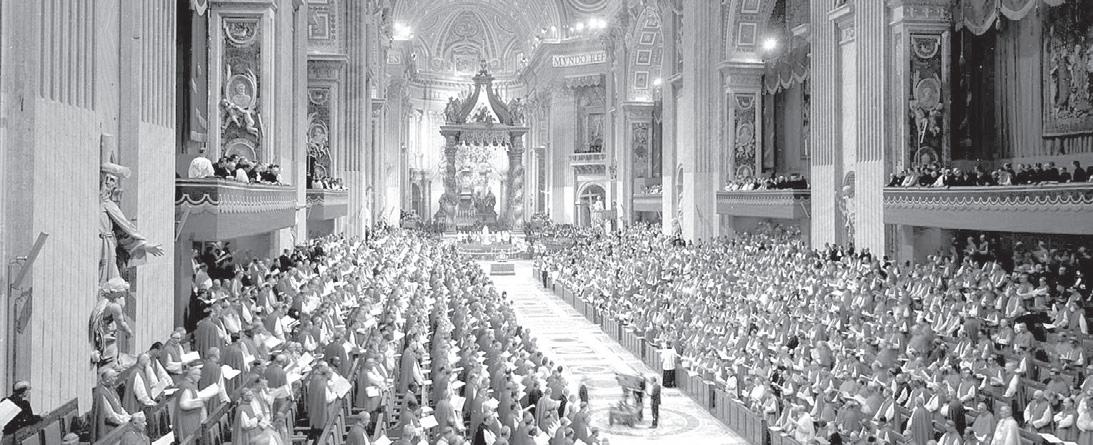
in many of us a nostalgia for the times when Catholic realities were perceived to be enduring and invariable. They might have been perceived as such, but in actual fact they were in constant movement, then and now, towards a fuller catholicity.
More specifically, it might be argued with some accuracy that in the code of the oriental Church the emphasis is on flexibility: inculturation is so characteristic because five ritual traditions coexist, each one of them sustained and differentiated by the diversity of culture. By contrast the Code of Canon Law, with virtually one Roman rite, emphasises preservation of that same rite rather than inculturation which could arguably give rise to several rites. In other words, even in the Church difference seems to be generating more difference, while the longing for uniformity follows the pattern of selfpreservation.
Fidelity to its divine origin will ensure that the Church will remain one and the same, as it
struggles to come to terms with the world that waits to be evangelised, in its great variety of historical and cultural expressions. Dialogue with this world is of the essence, and this very necessity lays on the Church the need for flexibility and adaptability. The Church cannot respect its identity without embracing change but, at the same time, in such a world it must change in order to retain its core values and identity. Diversity is not just one of the many attributes of the Church, diversity is the Church.
The Church of Vatican II has identified a three-fold process, by which its message is delivered to the world. First, the Word of Jesus Christ is filtered by the words of specific peoples and cultures. Second, since the message is meant for all peoples and cultures, each one of them has a right to hear the message, even if it cannot be identified with a specific cultural expression. Third, the message transforms cultures and is itself enriched in the process.
What is Spiritual Formation?
What actually happens in a seminary to assist seminarians to develop their spiritual life?
The Church has time honoured ways which include:
The Word of God; this is foundational and it needs to be understood, meditated on and integrated into daily life. The Eucharist; its proper preparation and devotion, of course has a central place in the life of the seminary because of its central place in the life and ministry of the priest. The Divine Office or Prayer of the Church is another crucial aspect of the spiritual life of a priest. The Rosary and devotion to Mary, a treasure of Catholic spirituality, along with other private devotions are also an essential part of one's spiritual formation.
The identity of the priest, his life and ministry are founded on Jesus the priest. Therefore an intimate relationship with Jesus, and personal conversational prayer are crucial. For these to develop, a seminarian needs to value silence, and a reflective attitude to life. What can be very helpful in all of this, is daily meditation, the annual retreat and days of reflection.
We also look at and learn from the lives of the saints, especially the founders of the major Religious Orders and Congregations, for they have also much to offer to the diocesan priest ... for example the spirituality of St Ignatius is most helpful in the area of discernment.
Celibacy is obviously a most important element of spiritual formation. We need to have a proper understanding of what celibacy means and asks of priests, so that we can have a personal appreciation and commitment to this Gift from God. In a very powerful way celibacy can unite the priest's search for intimacy with God and his love for the people entrusted to his care. While this union is a life time quest, it can be especially profound in our preferential love for the 'poor'.
Finally every seminarian has a spiritual director or guide to assist him in his spiritual journey. Spiritual formation is all about developing a priest who is a man of prayer and a leader in prayer.
For more information on the spiritual formation at St Charles or for other inquiries about admission into the seminary from interested men in the Guildford Zone or elsewhere, Fr Nino can be contacted at Tel No 9279 1310 or Fax No 9279 2772.
Bishops fill St Peter’s Basilica as Pope Paul VI presides over a meeting of the Second Vatican Council. Photo: CNSEvangelization is the top priority said the newly ordained priests Fathers Thai Vu, Vittorio Riccardi and Miguel Zavarese.
Archbishop Hickey ordained the three men in front of more than 700 people at St Mary’s Cathedral last Friday night, 26 November.
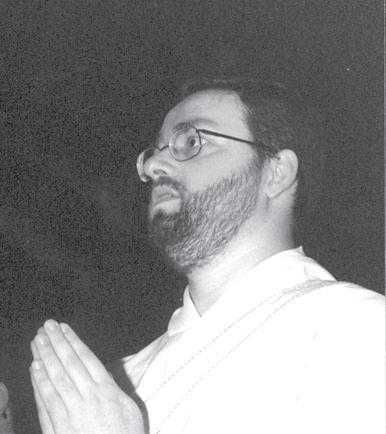
Fr Zavarese, who is from Brazil, said he sees the great need for evangelization as being at the forefront of his calling to the priesthood.
He said that he had lost interest in the Church at the age of 10 and stopped attending Church at 15.
But he came back to the Church in 1993 after listening to a series of talks given by members of the Neocatechumenal Way, one of the new movements in the Church.
“The talks gave me back the hope that I had lost and gave a new meaning to my life.”
Entering seminary life in Brazil in 1995, Fr Zavarese came to Australia in 1996.
In Australia, he studied at the Archdiocesan Redemptoris Mater Missionary Seminary in Morley, which prepares priests for the New Evangelisation called for by Pope’s Paul VI and John Paul II, according to the instruction of the Neocatechumenal Way.
There, each seminarian undertakes pastoral work in a parish or catechesis with the Neocatechumenal Way in parishes and dioceses around Australia as part of their training.
From 2001 to 2003, Fr Zavarese served in Mexico as part of his pastoral experience.
“This experience helped me to see the providence of God, because
I lived only on providence,” Fr Zavarese said.
“I was able to see people converting when I announced the Gospel and that gave me a lot of joy,” he said.
It was at this point that he realised announcing the Gospel was what he wanted to do for the rest of his life.
Fr Zavarese spoke about the great need for a deepening of faith.
“The world is easily attracted by the ‘word’ of society and has been largely seduced by consumerism,” he said.
Fr Vittorio Riccardi, who also studied at Redemptoris Mater Seminary, said the calling he received before the priesthood was to become Christian through his baptism.
It was through his Neocatechumenal community that he says he was able to get to know himself better.
“If you don’t know yourself you are not free,” Fr Riccardi said.
“This happens also by understanding other people, and loving, as Christ wants us to love,” Fr Riccardi continued.
Fr Riccardi from Italy, came from a Catholic family, but left the Church at 14.
It was at this young age he says that he was influenced by the world to be independent of other people.
“I was completely alone,”
“I was concentrating on my studies, on getting my career.”
But for him this caused much unhappiness.
His life changed dramatically at the age of 24, following the death of his grandmother and failure in his studies.
“The foundation of my life fell down,” he said.
It was at this point that a close friend invited him to listen to an eight-week series of talks, or catechesis, given by members of the Neocatechumenal Way in his parish.
In the beginning, he went out of curiosity but soon after realised that the talks were speaking to the situations of his life.
He began listening to the Word of God in Scripture on a regular basis, and, he said, this gave his life meaning.
After listening to the talks, Fr Riccardi came to realise that there was another person, Jesus Christ,
who had taken his place on the cross out of love for him.
“He loved me as I am,” Fr Riccardi said.
But it was not until a meeting with Pope John Paul II and the initiator of the Neocatechumenal Way, Kiko Arguello, in Italy that he felt the call to the priesthood.
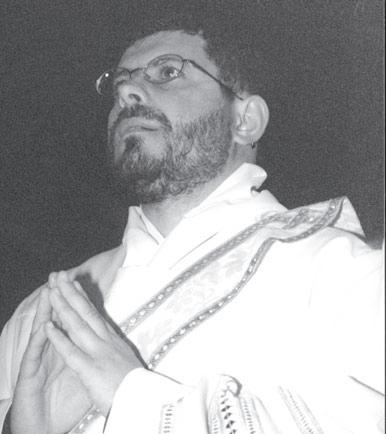
He entered the Redemptoris Mater Seminary in Morley in 1997 after having worked in Italy as a surveyor.
Fr Riccardi said it is important to aim to take on the nature of Christ.
“That is to love beyond death, to always forgive the other one” he said.
The ability to do this is a spontaneous gift from God and one of the fruits of the Eucharist.
During his time at the seminary, Fr Riccardi undertook a number of years in pastoral experience around Australia, during which time he was able to confirm his calling to the priesthood.
“The experience around Australia helped me to discover that it is possible to be happy when announcing the Gospel,” Fr Riccardi said.
“I realised that if Christ has done something for me, out of gratitude I can announce the Gospel to all humanity,”
“This brings me joy and happiness.”
Fr Riccardi went on to speak about the challenges faced when announcing the Gospel.
“There is also the rejection. In these times I remember the words of St Paul which says I am proud to take insults, rejection and persecution on account of Christ.”
Reflecting on one such experience in Canberra in 2001, he said “The fact that I was giving myself was enough.”
Both men will be available after two years for missionary work in another diocese should it be necessary.
Meanwhile, Fr Thai Vu, from St Charles Seminary in Guildford was inspired by the example of the priests that went before him.
However his decision was not based on a particular religious experience.
After coming to Australia from Vietnam 16 years ago during his adolescent years, Fr Vu said he wanted to be a social worker or a teacher after experiencing a strong desire to help others.
Eventually he realised that this was his calling to the priesthood.
“The priesthood is different because you have the ability to bring people to know God,” Fr Vu said.
Before entering the seminary, Fr Vu attended Mass regularly at Morley and Embleton parishes and also at the Vietnamese Community in Westminster. After graduating from Aranmore College, Fr Vu studied engineering for two years before entering the seminary.
He says there were many events
that helped him discern his vocation, including his 21st birthday.
“I came to realise it was a different calling and I was open to try it.”
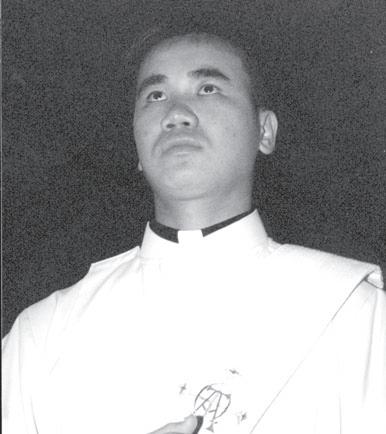
He began asking himself what the will of God was for his life and doesn’t deny that, at times, he struggled during his time at the seminary.
“But if it was always easy, I wouldn’t have believed that I could become a priest,” he said.
Now, he constantly draws upon what he was taught at the seminary – the spiritual, human, academic and pastoral.
“My formation is an ongoing process,” Fr Vu said.
“There is always plenty of room to improve.”
In his interview with The Record just days before his ordination, Fr Vu spoke about the situation of the young people in today’s society, having lived through that only recently himself.
“That’s why it is important to be a sign for the lives of other people,”
“Every person you meet is a chance to evangelize.”
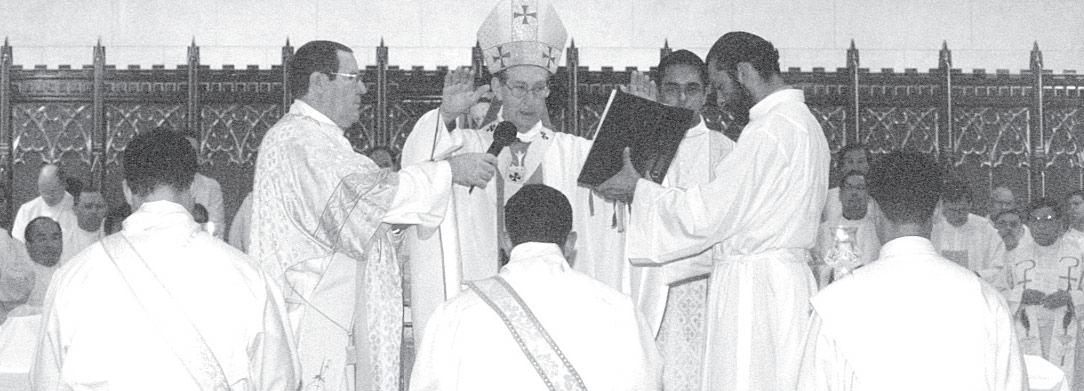
Continued from page 1 the Orthodox Churches said: "I am overwhelmed and very happy. Not only personally, but so is the whole Church of Constantinople and I can say without reservations, the whole of Orthodoxy, the whole Christian East.”
"It is a very important step towards full unity between our sister Churches, I consider it is the most important of my Patriarchal services over these last 13 years. We give thanks to His Holiness, John Paul II”.
Patriarch Bartholomew I was elected successor of St Andrew the Apostle in the See of Constantinople
in 1991. The Patriarch welcomed in his plane for the return trip to Istanbul, a Holy See delegation headed by Cardinal Walter Kasper, president of the Pontifical Council for Promoting Christian Unity.
The papal representatives joined the Church of Constantinople and many other Catholic and Orthodox leaders on Tuesday for the celebration of the feast of St Andrew.
"We can expect other steps forward," said the Patriarch. "We cannot foresee which ones they will be, but they will always be positive, always fraternal steps that will promote good relations between us. Each one of these steps will
be a stone in the construction of the building of full unity."
Archimandrite Ignatios Sotiriadis of the Greek Orthodox Church, in earlier statements to Vatican Radio, said, "For us, the significance of this event is very great."
"The return of these relics means that one more bridge is created between the sister Churches of Constantinople and Rome, between the Catholic Church and the Orthodox," he said.
According to the Pontifical Council for Promoting Christian Unity, when Patriarch Bartholomew I met John Paul II in Rome last June 29, he invited the Pope to Istanbul
and asked if the relics of the saints could be returned from the Vatican to the See of Constantinople. The relics have been kept in St Peter's Basilica. An exchange of letters between the Pope and the Patriarch followed, leading to Saturday’s presentation.
"The handing over of the relics," the pontifical council said in a statement, "is a profound encouragement to walk the path of unity: the mortal remains of the two saints, Patriarchs of Constantinople, who did everything possible to safeguard unity between East and West, venerated in their land of origin, welcomed with great honours
in the Church of Rome, which for many centuries has preserved and venerated them, walk once again on the path to the East, thanks to this gesture of spiritual sharing which nourishes and fortifies communion between the Sees of Peter and Constantinople."
John Paul II arranged that the relics be enclosed in precious alabaster reliquaries.
When they arrived in Istanbul later on Saturday, they were stored in a chapel of the Patriarchate so that, on the feast of St Andrew, on 30 November, they could be permanently placed in the Patriarchal Church of St George. - Zenit
Federal bankruptcy judges in Portland and in Tucson, Arizona. have set April 2005 deadlines for victims of childhood sexual abuse by Catholic clergy in those dioceses to submit claims.
Both judges approved media notice campaigns that would invite additional victims to come forward before the deadlines.
In Portland, however, Judge Elizabeth Perris also ruled that victims who are aware of having been abused will not be limited by the court-set deadline if they have not yet recognised the personal damage caused by the abuse. The Portland Archdiocese, facing lawsuits by more than 60 plaintiffs seeking more than $300 million, filed for bankruptcy protection on July 6 under Chapter 11 of the US Bankruptcy Code.
The Tucson Diocese made a similar filing September 20. It faces lawsuits by 33 plaintiffs who seek millions of dollars for claims of childhood sexual abuse by church personnel.
On November 10 the Diocese of Spokane, Washington, announced plans to invoke Chapter 11 protec-
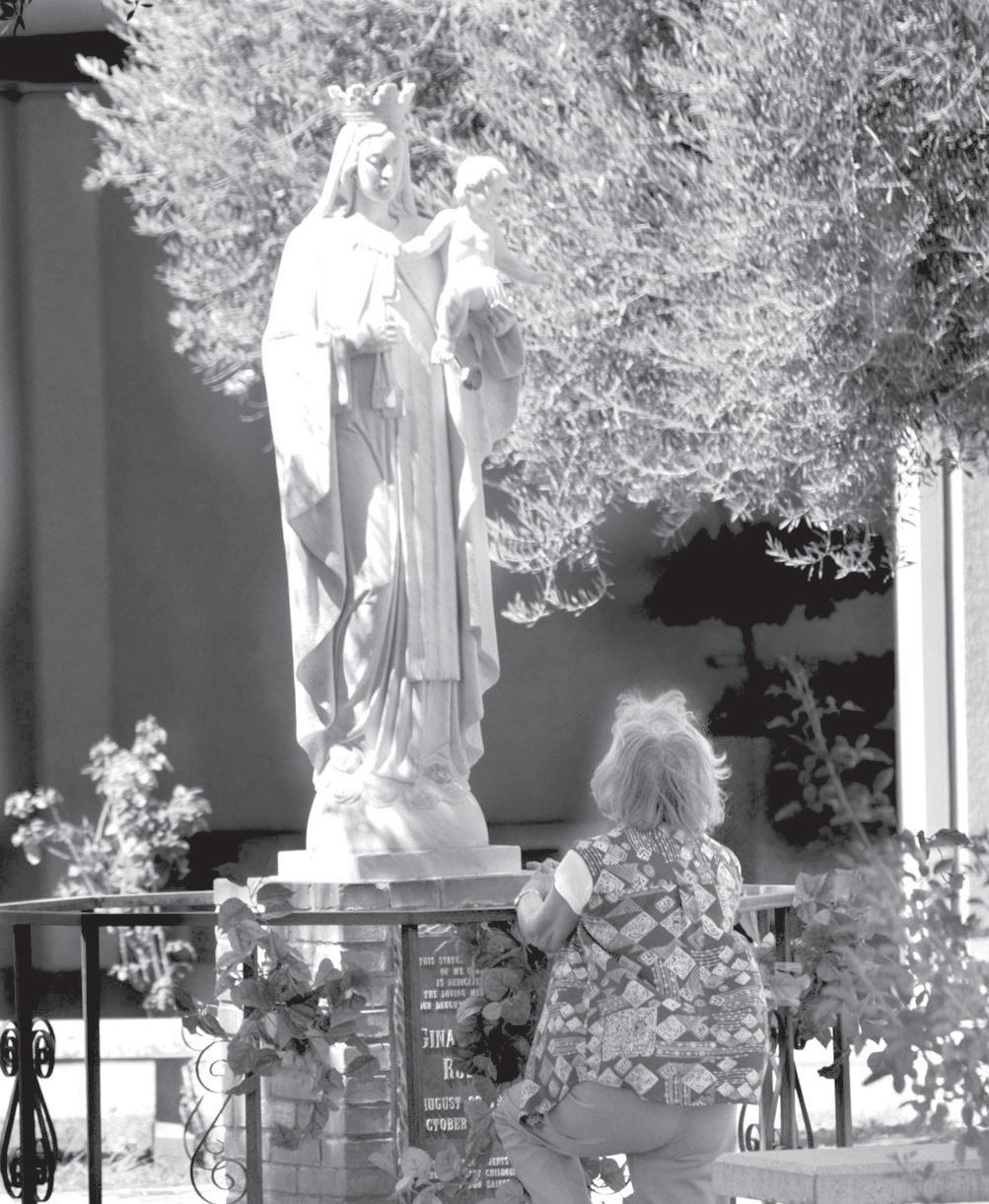
tion after attempts to mediate the claims of some 125 alleged victims broke down. In late November the diocese moved its target date
for filing from November 29 to December 6.
Chapter 11 sets out a procedure by which a federal bankruptcy
The Catholic Church has a strong hierarchical structure, but it also lives and acts in the world through the work of lay associations and movements, said the head of the Pontifical Council for the Laity.
Archbishop Stanislaw Rylko, council president, made his comments in the introduction to the Index of International Associations of the Faithful.
The index includes the selfdescriptions of 123 lay associations, communities and movements that have a formal relationship with the laity council.
Published only in Italian, the index was released to coincide with the opening of the council’s plenary assembly on November 25.
Translations into English, Spanish and French are planned.
A statement from the council said the project began in 2000 at the request of Pope John Paul II to have a comprehensive listing of Catholic lay groups.
The council sent out questionnaires to groups it was in contact with; the 123 groups listed responded to the questionnaire
“in different ways and at differ-
communities around the world,
judge oversees the reorganisation of a corporation in a way that provides equitable settlement of debts and other claims against it within its financial means. One goal of a Chapter 11 proceeding is to let the corporation remain in business instead of liquidating all its assets and dissolving itself, as it would have to do if it declared bankruptcy. In a ruling on November 19, Judge Perris set April 29 as the date after which no new claims can be filed. She exempted those who are still minors, those who have blocked memory of the abuse and those who are aware of the abuse but have not realised a possible connection between the abuse and personal problems such as mental illness or substance addiction.
A Portland archdiocesan insurer that refuses to pay settlements called the judge’s inclusion of people who remember the abuse but have not yet connected it with personal damage a “radical departure” from usual court practice. Observers regarded the ruling as a potentially serious setback for the Portland Archdiocese, since one of the main goals of its Chapter 11 filing was to resolve liability for claims of past abuse.
Archdiocesan lawyers had sought to limit post-deadline claims to individuals who are still minors or who have blocked out all memory of the abuse. Perris
also opened the door to possible punitive damages against the archdiocese. She said plaintiffs’ attorneys could review archdiocesan files on 37 priests publicly identified as subjects of sexual abuse claims and interview people to build a case for a possible claim of a pattern of past negligent behaviour on the part of archdiocesan officials.
To help move the bankruptcy proceedings forward, she directed the 60 current abuse plaintiffs and the archdiocese to begin mandatory mediation. She approved the archdiocese’s proposal for an ad campaign to alert victims who have not yet done so that they must come forward by April 29.
The estimated cost of that campaign is about $300,000. Perris rejected a multimillion-dollar proposal by plaintiffs’ attorneys that would have included television ads with photos of accused priests.
Perris will not rule until early next year on one of the most crucial issues in the case, the extent of the archdiocese’s assets.
The archdiocese claims that archdiocesan assets are less than $20 million. Plaintiffs’ attorneys claim the parish properties are also part of the archdiocese’s assets, a position that would increase the archdiocese’s total net worth to about $500 million. -CNS
ent times.” All of the groups, for example, list the regions or countries in the world where they have members, but while some give a membership figure, others do not.
Council officials, the statement said, edited the material only to ensure clarity and some equality in the amount of space dedicated to each group.
The council decided to include only groups that have an international presence and only those whose primary contact with the Vatican is through the Council for the Laity.
Opus Dei, which began as a lay movement but is now a personal prelature, is not listed in the index, although the Cooperators of Opus Dei are. The cooperators, while not formally belonging to the prelature, support the work of Opus Dei through their prayers, time and economic contributions.
The Neocatechumenal Way, which includes hundreds of lay
also is not listed. While it does operate under the guidance of the council, it considers itself “an itinerary of Christian formation” and not a movement or association.
Most of the 123 entries include a brief history of the group, and all of the entries contain a statement of identity.
The oldest group is the Militia Christi, a chivalric order founded in 1209 by the Dominicans. Reorganized in 1870, its focus has been to educate members in Catholic doctrine, ecumenism, Marian piety, social justice and acts of charity.
The group has 506 members in nine countries.
The newest association is Signis, an international association for Catholic communicators formed in 2001 with the union of Unda - the international Catholic association for radio and television - and the International Catholic Organization for Cine ma. -CNS
A promotional pop video for Brian McFadden, a former member of the popular Irish boy band Westlife, has caused students at a Dublin school to be taunted about allegations of child abuse.
Sony BMG recalled copies of the video sent to television stations worldwide after officials at St Fintan’s High School claimed they had been unfairly identified.
The video depicted McFadden as a taxi driver driving around north Dublin and reminiscing about his childhood.
Although St. Fintan’s High School was not depicted in the video, at one stage McFadden was shown standing beside school railings bearing the plaque “St. Fintan’s Boys’ School” while he sang about being gay and being subjected to corporal punishment by Christian Brothers.
Although McFadden went to a Christian Brothers school, at no time was he a pupil at St. Fintan’s.
Critics also being pointed out that McFadden, 24, was raised in an era when a culture of brutality was
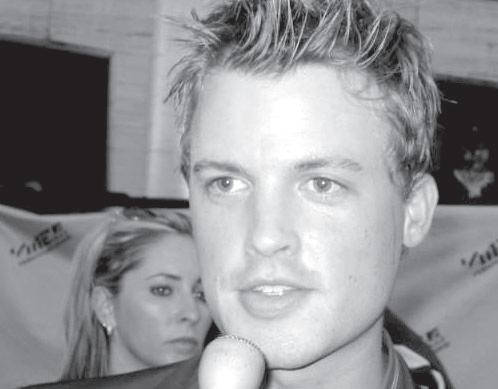 Brian McFadden
Brian McFadden
no longer common in Irish schools. Corporal punishment was made illegal in 1982.
In a statement, Sony BMG said they thought the name of the school shown in the video was fictitious.
“As soon as we were made aware of the issue, the promotional video was removed from TV stations, the shot was removed and a new version of the video was issued,” said a Sony BMG statement.
However, the headmaster of St Fintan’s, Richard Fogarty, said he did not believe use of the school name was accidental.
“We are the only St Fintan’s School in the north side and the only Christian Brothers school in this area,” he said.
“Brian McFadden lives in Portmarnock, in the next parish, so he should be aware of that.”
“Damage has been done to our good name and reputation." -CNS

Nuncio says Church’s diplomacy rooted in its religious, moral nature
The Vatican nuncio to the United Nations said in a lecture that the validity of Catholic participation in international diplomacy is historically rooted and widely acknowledged, but the Church’s participation has “characteristics that set it apart” from the diplomacy of others.
“The Holy See acts in the international arena according to its nature and ends, which are essentially religious, moral and humanitarian,” said Archbishop Celestino Migliore.
It does not engage in military affairs, territorial disputes or the international trade and financial activity that absorb much of the normal diplomatic routine, he noted.
Nor, he added, can it rely on military or economic muscle to advance its interests. Its authority comes from religious and ethical factors, the nuncio said.
Archbishop Migliore empha-

sised that papal diplomats, in contrast to others, do not represent the interests of any territory, not even the small territory of Vatican City. Archbishop Migliore said that while many people consider the influence of religion weak, the Holy See considers “the creative impact of religious and ethical factors capable of influencing the evolution of geopolitical paradigms.”
Pope John Paul II, he said, gave strong emphasis to interreligious dialogue long before the terrorist
attacks of September 11, 2001, which led many other people to elevate its importance.
Archbishop Migliore said religious and ethical factors have not only survived in the face of pressures such as Marxism and technical rationalism, but “have actually re-emerged, making their presence felt again on the world stage as indispensable and effective components in the development of modern political ideology.” The nuncio acknowledged that “religion plays a central role in
much of the world’s strife today,” but said its importance would likely “continue to increase in response to the perceived threat to traditional values” coming from globalisation.
Although Marx called religion the opiate of the people, Archbishop Migliore said it actually was “the vitamin of the poor” because it gave a sense of identity to those “who otherwise get left behind on the road to globalisation.”
Many people who had long recognised “the divisive influence of religion” have come to see “the potential contribution of faith-based initiatives in international peacemaking,” he said. Archbishop Migliore said a characteristic of the diplomacy of Popes and papal representatives was a rejection of the agnostic view that no absolute truths were obtainable, and that relativism was better for safeguarding freedom. But the Catholic Church maintains that “freedom only reaches full development when it acknowledges truth,” a concept people of faith put “beyond the manipulation of politicians,” he said. -CNS
It seems like only yesterday that Pope John Paul II convened a series of continent wide synods of bishops to prepare for Holy Year 2000.
So it came as a bit of a surprise when the Pope announced in mid-November that he was calling a second African synod, to deal with new pastoral and social challenges on the continent.
But a closer look reveals some deeper reasons behind the synod decision, many of them tied to the fast pace of change - for good and bad - that has visited the African continent since the last synod ended in 1994.
Consider these church develop-
ments:
■ Of Africa’s 426 active bishops, nearly half were named in the period 1995-2004, so never experienced the synod.
■ The continent’s Catholic population has increased over the same period by an estimated 30 percent.
■ The number of parishes has increased more than 20 percent, the number of priests and seminarians around 30 percent and the number of women religious about 18 percent.
■ All these factors help explain why Africans on the synod’s fol-
Efforts to move the United Nations toward developing an international convention against human cloning were abandoned because of irreconcilable differences among member nations over how far the ban should go. Instead, the legal committee of the UN General Assembly decided on November 19 that it would give up attempts to get a convention and try to deal with the subject in a compromise declaration. The declaration would lack the legal force that a convention has for those countries that ratify it.
A resolution introduced by Belgium and supported by a number of other countries called for a convention that would rule out
low-up council began floating the idea of a second synod a few years ago.
■ The changes in Africa’s social situation over the last decade have been no less dramatic:
■ Ethnic and political conflicts have raged in places like Congo, Sudan, Ethiopia, Liberia and Ivory Coast, with estimates of up to 4 million people killed. Some 4 million more have been made refugees, and more than 10 million have been internally displaced.
■ More than 20 million Africans have been infected with AIDS/ HIV since 1994. In sub-Saharan
reproductive cloning to make a baby but let each country decide its own policy regarding therapeutic cloning, whereby scientists clone embryonic stem cells for therapies to repair or regenerate tissue to cure diseases. Supporters of the resolution argued that a consensus already existed against reproductive cloning, and the United Nations could and should move quickly to put that consensus into international law.
But they were not willing to ban cloning for research purposes, which many people say holds the prospect of bringing cures for diseases such as Parkinson’s, Alzheimer’s and multiple sclerosis.
Pope John Paul II encouraged Catholics to rediscover the importance of Sunday Mass during the Advent season. The period
Africa today, about 7.5 percent of all adults aged 15-49 are HIVpositive.
■ While Africa still lags behind the rest of the world in communications technology, use of the Internet in Africa has soared in recent years. About 13 million Africans are now online.
■ Urbansation in sub-Saharan Africa jumped by more than 15 percent, taxing city social services and creating a whole new urban landscape of poverty.
African church leaders can point to some successes after the 1994 synod, which resulted in 76 final recommendations and a 149page papal document outlining a pastoral plan of action for Africa. -CNS
before Christmas is a perfect time to reflect on “the meaning of Sunday, its ‘mystery,’ the value of its celebration, and its significance for Christian and human existence,” the Pope said.
He made the remarks at a noontime talk from his apartment window above St. Peter’s Square on November 28, the first Sunday of Advent.
The Pope said a rekindling of interest in Sunday Mass was essential for the Church, especially during the current year dedicated to the Eucharist. In the Mass, he said, the Church recognises Christ as “the centre of history” and finds in his loving sacrifice the ultimate meaning of the mystery of the faith.
The papal remarks were occasioned by the start of preparations for an Italian eucharistic congress in 2005; its theme will be the importance of Sunday Mass.
Natural law, the status of theology and the fate of children who die without baptism are among the topics the International Theological Commission will tackle over the next five years.
The secretary of the commission, Father Luis Ladaria, explained after the panel’s recent plenary session, clarifying that “to concentrate only on the question of limbo” - as some of the media have emphasised - “would be to lose the focus of the problem.”
On the specific topic of limbo, Father Ladaria, a professor at the Gregorian University, stressed that it would be studied “in the light of God’s mercy.”
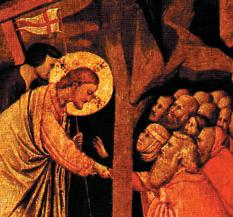
He affirmed that “limbo is not the problem; in fact, it was a historical attempt to proffer a solution in the face of the death of a child who has not been baptised.”
“What is interesting is to study this topic in the light of God’s universal saving will, the unique mediation of Jesus Christ, and the Church’s sacramentalism,” he said.
In addition to limbo, the theologians of this commission, which forms part of the Congregation for the Doctrine of the Faith, are studying natural law - moral norms that correspond to man’s nature and that can be known by the use of reason - and the status of theology and its methods.
The commission comprises theologians of various schools and nations, distinguished for their knowledge and faithfulness to the Church’s magisterium. The members are appointed by the Pope for five years after being proposed by the prefect of the doctrinal congregation. - CNS
The parish should be “an open door” to salvation, Pope John Paul II said. In an address to the Pontifical Council for the Laity, the Pope called the parish the “vital cell” where lay people find their “natural place for participation in the building and in the mission of the Church in the world.” The parish “is an open door for everyone, so that each person has access to the path of salvation,” the Pope said when he met council members. “It is the place par excellence for the announcement of Christ and education for the faith,” he said. Parishes need to constantly renew themselves in order to be a true community and to carry out their missionary activities, the Pope said. The Eucharist, the Pope said, is “the beating heart of the parish, the source of its mission and the presence that constantly renews it.”
David Nazar, SJ, a Canadian Jesuit working in the Ukraine describes the strength of the Ukrainian people in this report to the Jesuit Media Office.
I was in Kyiv for the Election Day, November 21, and for the first two days of demonstrations.
I was with the crowds on the famous Independence Square in the heart of Kyiv.
The people are educated and have always cherished education. Their articulate desires for justice, transparency and rule of law come from within, although obviously informed by what happens in other countries. Certain western countries are often referred to as having elements worth emulating. They look to the EU and US for political support, rather than cultural role modelling. It would be wrong to construe their view of the West as a naive pining for its benefits. In short, Christian values dominate local hopes with an educated understanding of the world and its possibilities.
In principle, much hinges on the present moment. However, only in principle. If there is not a social victory at this moment, it will come next time around. This election is the last gasp of the old powers and they seem to know it. They simply could not control and manipulate as they had hoped, despite massive and expensive efforts.
Ukrainian culture, at its best, has a strong spirituality and sense of solidarity, especially with the suffering. There is no sense at the moment that Christian witness stands against Ukrainian culture, only against the powers and principalities that have darkly ruled for so long.
The more moving question is why this people, who know what has been happening all along, did not resort to violence, but chose peace and patience with hope through many years of long-suffering. In that sense, the moment represents the victory of Christ alive within the heart of the people.
As for the church, one must keep in mind that the Orthodox Church is divided on nationalist grounds. The largest church in Ukraine, is the Ukrainian Orthodox Church Moscow Patriarchate. The Patriarch is in Moscow and cannot easily visit Ukraine nor even speak about it since he is Russian. Half of his church is in Ukraine, where religious practice is strong (up to 30%), as contrasted with Russia (about 1% by Orthodox estimates). So Ukraine is very important to the survival of his church.
The Moscow Patriarch is regularly on record as saying that he wants the return of all the former Soviet countries back into one federation under Russia. You can imagine how badly that is received

in former Soviet Republics like Ukraine.
There are two other Orthodox churches of significance: the Ukrainian Orthodox Church-Kyivan Patriarchate and the Autocephalous Ukrainian Orthodox Church. These two would share the same perspective on Ukraine as the Greek Catholic Church and the Latin Rite Church: democratic principles, rule of law, transparent government, international standards and so on.
On political issues these churches would be at one- and a fair number of the Moscow Patriarchate parishes would be on this side of the fence, though not the hierarchy. Hence, any question of negative effect on inter-church relations by these elections is not an issue. The Ukrainian based churches would be united, and the more so in the current situation.
In this context, the presence of a Catholic patriarch in Kyiv, has no relation to the political questions. The only vague thing one might deduce is that the favoured candidate of the old-guard powers favours stronger relations with Moscow, which plays into the Moscow Patriarch’s hand, though the very same position loses support quickly among Ukrainians.
The “eastern-western Ukraine” thesis is overstated and thus a simplification. For example, the opposition candidate who, by all accounts except the official one, won by a substantial majority, is from northeastern Ukraine. Western and Central Ukraine, including Kyiv, support him overwhelmingly. He has strong support in southern Ukraine, and weak but real support in southeastern Ukraine.
Southeastern Ukraine is the most densely populated and owes its livelihood to the old-guard powers going back to soviet days. There are 500 local coalmines all supported heavily by $500 million of annual government funding -- only 7% of mines make a profit.
From the point of view of the International Monetary Fund and the World Bank, this is an impediment to further loans for economic development. From the point of view of the politicians in power, they cannot survive without the coal region’s votes.
The current president and the
prime minister (who is the president’s choice for the next president) are both from that region. Since the local people see no other source of income, their votes are for the preservation of their jobs, as they will readily say.
Because of the consequent strength of the government in this region, this is where the most significant vote falsification took place: by some counts 101% of the population turned out for the vote and 100% of them voted for the government candidate.
The voting lists suggest that many rose from the dead briefly to vote. The complaint in the country is not east against west, but corruption against fairness.
The international community, whether expatriate or not, plays a very significant role in Ukraine. I am always surprised by how much. The country cherishes the connections for historic and economic reasons.
When the West speaks, whether Canada, USA, Britain, Germany or the EU, it is news here that gives the government pause. The current president sought to change the constitution six months ago to extend his term in office. The West objected publicly, even threatening to cut off aid if he tried. He dropped the issue literally overnight.
Likewise with the elections. As the West is doing at the moment, calling for a review of the elections and for transparency according to international standards has significant importance in Ukraine. Several national leaders and local ambassadors have spoken admirably on this theme.
For the most part, the Ukrainian Jesuits, like the general population, feel these issues very deeply. They evoke a whole century, even several centuries, of various forms of repression. People cannot eat or sleep. You can see on every face the stress of the moment and all it takes is an opening for them to speak and vent their feelings. “How long, O Lord, must we live in injustice.”
The inclination of the people is not toward violence. People feel their common unity beyond political divisions. It should be added that this is a praying country. Churches and monasteries have been praying in vigil since the election. People commonly say how much they are praying for a just and peaceful resolution. May it be so.
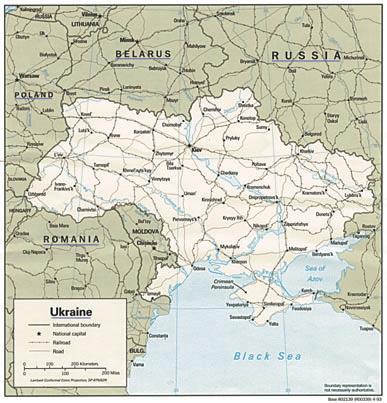
Dr Andrew Thomas
Kania gives a compelling account of the faith of Ukrainian Catholics through the Soviet persecution of 1946 - 89.
Frequently we observe in the media confronting images of socalled martyrs, men and women willing to die for a cause, yet just as ardently willing to take innocent third parties to their deaths as well. Such is the misuse of the word ‘martyr’ that it has now come to denote any individual with an utter disregard for their life and the life of others who seeks to die for a political or religious cause. As Catholic Christians we need to show greater care that the image of the suicide-bomber does not distort our perception of the martyrs who adorn our Church; for the distinction between the two is as stark as good is from evil.
Martyrdom in the Christian sense is not the willingness to die for a religious cause, it is the price that one has paid for witnessing to Christ in a world which can be violently opposed to the Christian message. Perhaps the most vivid example of martyrdom within the Universal Church in modern times, in terms of the scale of martyrdom, can be found in the Soviet occupation of Ukraine, 1946 – 1989.
The Soviet regime had promulgated a philosophy in which “religion was the opiate of the people”, and all that was real, was real because it could either be made or used. Within the geographic frontiers of this atheistic, political and economic experiment, lay the Ukrainian Catholic Church, despised by the Soviets on three grounds: Eastern Catholic, Ukrainian and Spiritual. As Catholics of the East the Ukrainians were perceived as having sold their souls to Rome; and Rome for the historically Orthodox Russians was anathema. Looking toward Rome, Ukrainian Catholics also had irrevocably aligned themselves with the West. As proud Ukrainians, the Church warranted eradication, as it resisted the tentacles of government from Moscow. As a Spiritual institution, it openly challenged the very underlying tenets of Soviet Communism, and was a threat to Soviet materialistic agenda. In 1946, adherence to the Ukrainian Catholic Church was declared a crime punishable by death. Churches were stripped,
icons were sold, bells were cracked, chalices were melted, schools were closed, frescos machine-gunned, Bibles burnt. Everything material was either taken or destroyed. Yet what of the Spirit of the Church; a Spirit residing not in the tangible, but deep within each individual?
Historians are now becoming increasingly aware of the degree of depravity and heroism which met head-on in the Soviet attempt to annihilate the Ukrainian Catholic Church. From 1946 onward the hierarchy and prominent members of the clergy were assassinated. Alongside the twelve bishops who were tortured and mutilated, were the ordinary clergy and laity, who became martyrs for continuing to serve the Church, in their quite ‘ordinary’ manner. Priests, teachers, nurses, and academics who just wanted to be Catholic priests and Catholic school teachers, Catholic nurses and Catholic academics, were slaughtered. In all, some 5,000 clergy and two million faithful were either murdered or deported. Of these: Blessed Nicholas Konrad was executed for visiting the sick; Blessed Volodymyr Pryima, bayoneted to death for teaching a Church youth choir; Blessed Andrew Ischak, shot and stabbed to death for tending to fearful parishioners; Blessed Severian Baranyk, murdered, with a cross slashed deep into his chest, for caring for orphans in a Ukrainian Catholic orphanage.
None of these individuals wished to die, all of these people had very strong pastoral and personal reasons to live. Yet a simple but brutal choice had been offered to them by the Soviets: renounce Christ, renounce the Catholic faith, renounce your parishes – and live. A married priest, thirty five year old Blessed Roman Lysko, could quite easily have returned home to his loving wife and happy family, and become a puppet of a man for the Soviet government. But instead, as brick piled high upon brick, in what was to become his tomb, he merely sang psalms to God, in a voice steady and brave. Blessed Nykyta Budka, could have easily denied his role as Bishop, when he was sent to a Gulag, and tortured. Yet instead his grave became the frosty plains, and his body taken by the animals of the forest.
In 2001, 28 Ukrainian martyrs were beatified by Pope John Paul II. The cause of many more is postulated.
The martyrs of the Universal Church are heroes not because of their willingness to die, but because of their willingness to live a life with Christ permeating its every breath and its every work. Rather than being a macabre sideshow, their example gives us courage, their example gives us hope; for in the end, their lives point to the Heavens, and give those who have doubts the sense that the more vehement the fire evil may fan, the richer and finer the metal which is eventually produced. Evil has its hour, yet in the end, Truth has conquered; Truth will always conquer.
■ BRICK RE-POINTING
Phone Nigel 9242 2952
■
■ PICASSO PAINTING
Top service. Phone 9345 0557, fax 9345 0505.
■ PERROTT PAINTING PTY LTD
For all your residential, commercial painting requirements. Phone Tom Perrott 9444 1200.
■ ALL AREAS
Mike Murphy 0416 226 434.
Classified ads: $3.30 per line inc GST 24 hour Hotline: 9227 7778 Deadline: 5pm Tuesday
■ WORK FROM HOME
Around your children & family commitments. My business is expanding and I need people to open new areas all over Australia. Training given. Highly lucrative. www.cyber-success-4u.org
■ BRIDGE WATERS LEGAL
For professional advice & legal representation. Probate, Deceased Estates, Wills, Conveyancing, Property and Business Settlements, Leases, Commercial, Property & Business law matters. Level 3, 267 St George's Tce, Perth, Ph: 1300 139 680
■
■ DUNSBOROUGH b/front, spec views across bay, pool, close to shops, sleeps 8 in comfort, Ph 0408 904 862
3 End-of-Year Mass for Mercedes College at St Mary’s Cathedral and Blessing of College Memorial GardenArchbishop Hickey Launch of Norma Woodcock’s Meditation CD “Jesus”, University of Notre Dame - Archbishop Hickey
4 Annual Mass of Thanksgiving for Members of Mercy Boards, Victoria Square Mercy ConventArchbishop Hickey
■
Address Chinese Community on the Eucharist, Willetton - Bishop Sproxton
5 Mass to celebrate 50th Anniversary of Holy Family Church, KalamundaArchbishop Hickey Mass to celebrate 150th anniversary of the Servite Order in India, Joondanna - Archbishop Hickey
7 LifeLink End-of-Year meetingArchbishop Hickey Emmanuel Centre Christmas PartyArchbishop Hickey Meeting with The Living Centre Board
Friday December 3
REIGN OF THE TWO HEARTS
All night vigil 9pm All Saints Chapel, Allendale Square, Perth until Saturday 7am with Mass for the First Friday and Saturday devotions. Rosaries and Hymns during the night. Enq: 9409 4543.
Sunday December 5
ETERNAL WORD TELEVISION NETWORK
1 - 2 pm on Access 31: Meditation on the Immaculate Conception with Fr Benedict Groeschel, followed by Psychology and Psychiatry/Abp Fulton Sheen (Life is Worth Living). Regretfully, due to a further technical problem, we were unable to present the program advertised for last Sunday, for which we apologise. This will be broadcast on December 12: The Season of Advent, members of the Brotherhood of Hope, with Fr Francis Mary Stone (Life on the Rock Series). We wish to thank generous donors for their kind contributions, which enabled us to renew the contract with Access 31. Viewers are reminded, however, that ongoing help is required, as the cost of TV presentation is high. EWTN videos are available on request. Postal address: The Rosary Christian Tutorial Association, PO Box 1270, Booragoon 6954. Enq: 9330 1170.
Sunday December 5
GATE OF HEAVEN:
Please join us this Sunday at 7:30pm on 107.9 FM, Radio Fremantle, for more Global Catholic Radio. This week we will feature: (1) Hail Holy Queen; Immaculate Conception with Dr Scott Hahn. (2) The Late Archbishop Fulton J Sheen; Evil of Birth Prevention. (3) Our Lady in Scripture and Tradition Blessed Among All Women. with Fr Andrew Apostoli. Sunday December 12: Our Lady in Scripture and Tradition; Our Lady of Guadalupe with Fr Andrew Apostoli. (2) Defending Life with Fr Frank Pavone Holocaust and Abortion. (3) GK Chesterton; The Everlasting Man with Dale Alquist. Donations toward the program may be sent to Gate of Heaven, PO Box 845, Claremont, WA 6910. Programs subject to change without notice.
Sunday December 5
DIVINE MERCY
Fr Douglas Hoare and The Santa Clara Parish Community welcome anyone from surrounding Parishes and beyond to the Santa Clara Church cnr Coolgardie and Pollock Sts, Bentley at 3pm on the first Sunday of each month for devotion in honour of The Divine Mercy. Commencing with 3
o’clock prayer, Divine Mercy Chaplet, reflection and concludes with Benediction. Special Graces are afforded to all who participate.
Tuesday December 7
CHARISMATIC RENEWAL MASS
The Catholic Charismatic Renewal invites all to our end of year celebrations, commencing at 7pm. Held at the Como Parish (cnr Thelma St/Canning Hwy, Como) the evening commences with Prayer & Praise, followed by Mass and concludes with a light supper. Please bring a plate of finger food to share. Queries to Pam 9381 2516, or Dan 9360 7400.
Wednesday December 8
YEAR OF THE HOLY EUCHARIST
Feast of the Immaculate Conception Hour of Grace, 12noon – 1pm. Exposition of the Most Blessed Sacrament at Holy Trinity Church Embleton. Enq: George Jacob 9272 1379
Thursday December 9
ECUMENICAL CAROLS SERVICE
The district ecumenical Carols Service will this year be hosted by the Willetton Uniting Church at 7.30pm. Choirs involved are from St Andrews Anglican Church, Shelley, and Queen of Apostles Catholic church in Riverton. All three choirs present a carol as an anthem during the service, which consists of traditional congregational carol singing, readings and prayers, with all three clergy involved as well. Willetton Uniting Church is in Herald Avenue, Willetton. Enq: Deirdre Russell, 9457 4010.
Thursday December 9
HEALING MASS
In honour of St Peregrine, patron of Cancer sufferers and helper of all in need, will be held at the Church of SS John and Paul, Pinetree Gully Rd, Willetton at 7pm. There will be Veneration of the Relic and Anointing of the sick. Enq: Noreen Monaghan 9498 7727.
Friday December 10
FULTON J SHEEN SOCIETY INC
25th Anniversary Mass for Archbishop Fulton J Sheen Servant of God. All welcome. Trinity College Chapel, Trinity Ave East Perth. 7pm. Followed by refreshments, and then a presentation of Sheen material. Concluding at 9pm RSVP Daniel on 92918224 fulton@sonet.net.au
■ RICH HARVEST BIBLES, Books, CD’s, Cards, gifts, Statues, Baptism & Communion Apparel, Albs, Vestments and much more. RICH HARVEST, 39 Hulme Court, Myaree, 9329 9889 after 10.30am.
9227 7778
.com.au
My stepdaughter, Melissa, is the kind of person who blurts out the first thing that enters her mind. One day, when she was about 11, my wife and I were helping her make a model volcano for class. We were up to our ears in plaster and paper maché. As is often the case, Patty and I disagreed on a certain procedure so we were giving poor Melissa conflicting directions. Finally she threw up her hands in frustration and said, “Please! Two horses can’t teach a calf!” It made perfect sense to her, but my wife and I are still trying to figure it out
of Management - Archbishop Hickey End-of-Year Mass for Pregnancy Assistance, SubiacoArchbishop Hickey Mass for Maranatha Institute, CEO Chapel - Bishop Sproxton Reception for the Birthday of the Emporer of JapanFr Brian O’Loughlin VG
8 Future of Parishes CommitteeArchbishop Hickey Mass to celebrate Golden Jubilee of Priesthood of Fr Barry Whitely, 3 pm, St Joseph’s, Subiaco
Mass for Feast of Immaculate Conception and conclusion of Solemn Novena, 7.30 pm, St Mary’s Cathedral - Archbishop Hickey Advent Reconciliation, WillettonBrentwood - Bishop Sproxton
9 Council of Priests’ Meeting, Glendalough - Archbishop Hickey, Bishop Sproxton
11 Christmas Party for ShopfrontArchbishop Hickey Graduation Mass, University of Notre Dame Australia - Archbishop Hickey
Sunday December 12
CELEBRATING THE GOSPEL OF LIFE
Honouring Our Lady of Guadalupe, Patroness of the unborn, Feast Day. 4pm Hour, 5pm Procession and Holy Mass. All Saints Chapel, 77 Allendale Square, Perth. Supporting organizations are Right to Life, the Legion of Mary, the Marian Movement, the Santo Padre Pio Prayer Group, Mary’s Companion Wayfarers of Jesus the Way, and the Knights of the Southern Cross. Come and join in! Bringing a plate is greatly appreciated.
Sunday December 12
HEALING MASS AND RECONCILIATION BULLSBROOK SHRINE
Reconciliation and the Sacrament of the sick are administered for the Spiritual and physical healing of pilgrims during Holy Mass on every second Sunday of the month at the Shrine of Virgin of the Revelation, 36 Chittering Rd, Bullsbrook. Reconciliation in Italian or English, 1.30pm preceding devotions. 2pm Exposition of the Blessed Sacrament, Holy Rosary and Benediction. Holy Mass at 2.30pm. All welcome to come to the Pilgrim’s Mass and devotions celebrated at the Shrine on every Sunday at 2pm. Enq: SACRI 9447 3292.
Tuesday December 14
REOPENING OF ST DOMINIC’S INNALOO
At 7pm, Archbishop Hickey will be celebrating Mass and blessing our reopened church. All friends of the parish and past and present parishioners are invited to attend. Supper will be in the Parish Centre afterwards. Please bring a plate. In this our Golden Jubilee year we would like all to join us in celebrating our reopening after the disastrous fire in June.
Sunday January 23
PORTUGUESE SARDINE FESTIVAL
Fundraiser for Crossroads Community at St Jerome’s in Spearwood at 1pm. Please ring CRC on 9319 8344 for more information.
ADORATION FOR LIFE
Join us in a perpetual chorus of prayer for a culture of Life before Jesus in the Blessed Sacrament. You choose the hour and the Adoration chapel in which you pray. Please contact us at adorationforlife@iinet.net.au <mailto: adorationforlife@iinet.net.au>, 8/10 McCourt St,
Leederville 6007, or 9375 2029 for more details. CROSS ROADS COMMUNITY
Term 4 – 18th October to 17th December for: Family & Friends Support Groups of Substance Abusers on Wednesdays 7– 9pm, Substance Abusers Support Groups on Tuesdays 5.30pm – 7.30pm & Friday’s All day Group for Substance Abusers on Fridays 9.30am – 2pm, Bible Night: Tuesdays 7 – 9pm & Healing Mass: Fridays 12.30pm. Healing Masses: 1st Monday of month 7pm Church of East Fremantle, 2nd Monday of month 10am St Jerome’s Munster. No Healing Masses in January 2005.
DIVINE MERCY HOLY HOURS
The Divine Mercy Apostolate invites you all to come and join us by rolling out the red carpet for Jesus in the following churches: St Mary’s Cathedral first Sunday of the month 1.30-3.15pm with a different priest each month. St Francis Xavier Church, Windsor St East Perth, the main centre for Divine Mercy Devotions each Saturday 2.30-3.30pm. Divine Mercy Holy Mass each 2nd Saturday 2.30-3.30pm including Sacrament of Healing. Main Celebrant Fr Marcellinus Meilak ofm. There are approx 20 Divine Mercy Holy Hours each week throughout the Archdiocese of Perth. Enq: John 9457 7771.
THE
OF
A video entitled The Living Presence is available for viewing in each parish in the Archdiocese of Perth at the request of the Parish Priest at a time suitable for their parish. Sponsored by The Divine Mercy Apostolate. Enq: John 9457 7771 or 0412 185 209.
Due to the large number of contributions to the Panorama section it is important to get your items in as soon as possible. Email: administration@therecord.com. au
or phone: KYLIE 9227 7080.
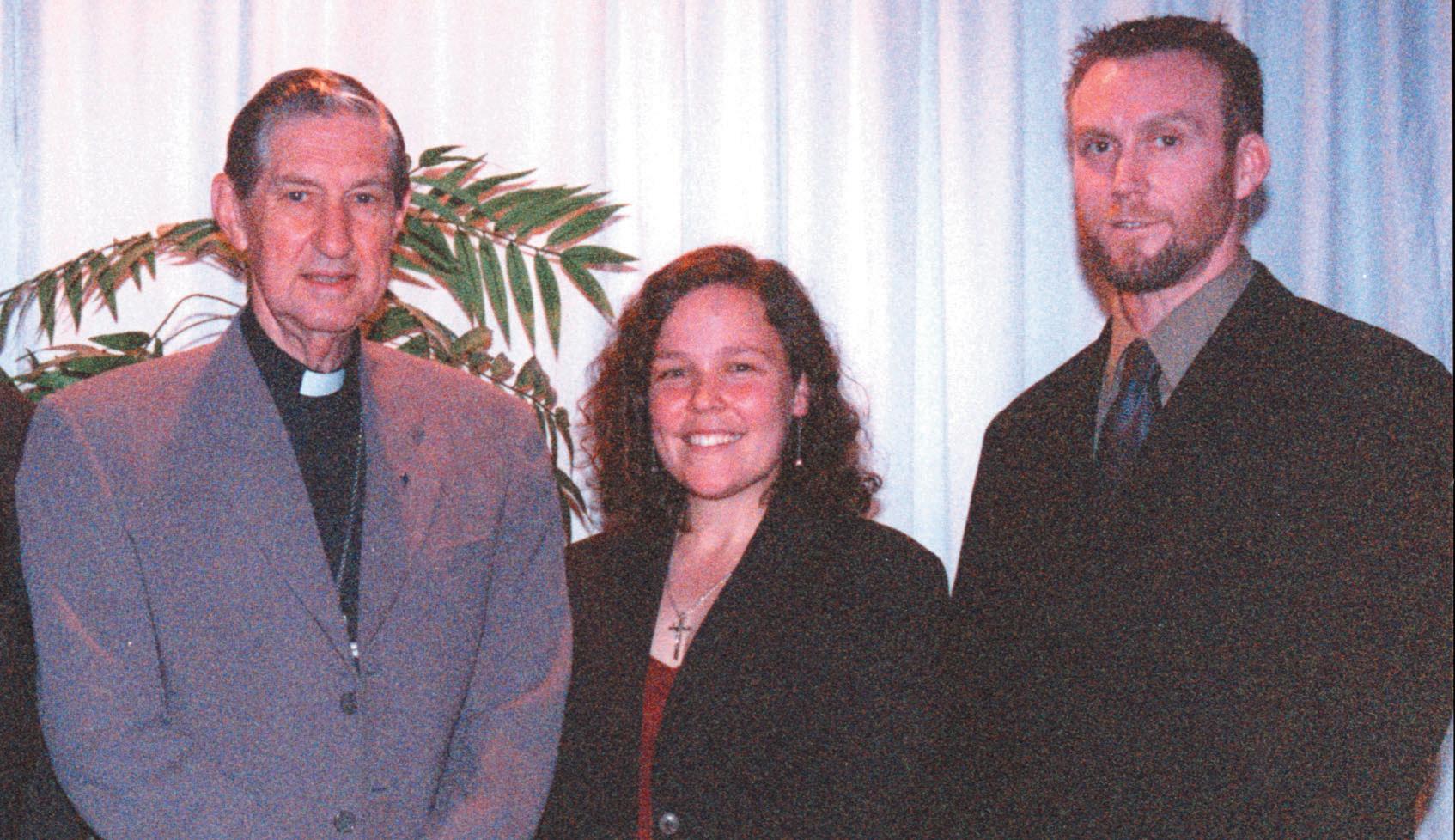
"No one told me that I could have a relationship with God."
Aremarkable story of the mercy of Christ has emerged from David Harp of Flame Ministries International, who told his story to a packed room at the Respect Life Office dinner dance last Saturday night.
At the age of 36, David Harp knows only too well the suffering associated with homosexuality.
His story starts from the age of 10, when he survived a car accident that killed two of his close friends.
“I remember my mother telling me, God has saved you for a reason,” David said.
David’s mother, Marion Pallas says she never had any doubts that he couldn’t come out alive from the accident.
He was in intensive care for two weeks.
“There is no way that David should have lived through that accident, but everything happens for a reason,” Mrs Pallas said.
At that time David was an Anglican, but felt God was someone far away and that it was impossible to have a personal relationship with him.
“No one told me that I could have a relationship with God.”
“He was presented as something, not as someone.”
After being sexually abused at the age of 13, David began a journey that ultimately resulted in a homosexual lifestyle.
At the age of 16, David’s parents divorced, and he moved to the city to live with his mother.
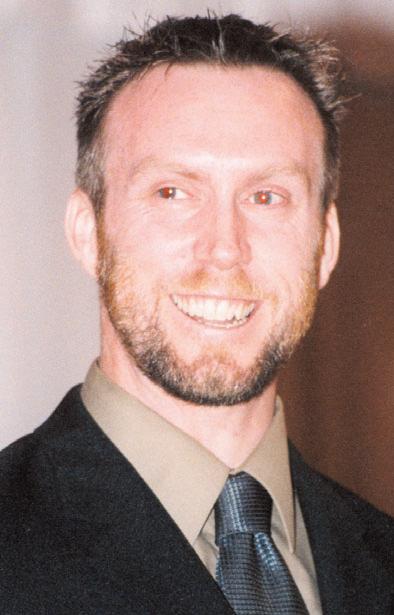
He finished high school, started a new job and was studying part-time at University.
Very soon he replaced God and the Church with what he thought was a more fulfilling lifestyle through homosexuality.
“At that time God was someone far away and I thought I could never have a personal relationship with him.”
Weekends would be consumed with binge-drinking and promiscuous sex.
It wasn’t until David was 20 that he met Shenton, a young Catholic man.
A couple of years later David began reading some of Shenton’s books about God and the Church.
“The books presented Jesus as someone that I could know,” David
explained. “It was the first time I had heard that Christ could exist in my life personally and that the events from the Acts of the Apostles can happen in my life today.”
From that moment, David knew his life needed to be different.
He made a solemn pact with Shenton to remain celibate as the only option available for persons with same-sex attractions.
In 1993, David saw a Flame Ministries “Praise Rally” advertised in The Record and knew he had to attend.
After seeing the excitement of those at the Charismatic Mass at St Mary's Cathedral, David became convinced that he could have this too.
He registered for an FMI "Set My People on Fire" conference and a few months later he was given the opportunity to go on mission with FMI to conduct “Set My People on Fire” in England.
Having also not had a good relationship with his father as he was growing up, David had the opportunity to reconcile with his him.
“I became really close to him in the year before he died and I felt that God was saying that everything was going to be ok.”
Without any hesitation, David became a Catholic on May 3 1994, the day before leaving to go on mission.
Back in Australia nine months later, David came to know that Shenton had broken their commitment to stay celibate.
Consequently David left FMI, stopped going to Mass and rejected God.
“At the time I felt that God had let me down.” A seriously sinful way of life became David’s way of filling the
huge feeling of emptiness that had overcome him.
He became a workaholic, which resulted in stress and clinical depression, started binge drinking again and was violent.
Attempts to take away his anguish by engaging in promiscuous gay sex, did not help solve the increasing numbness and despair.
Problems progressed when he began smoking marijuana, taking ecstasy, cocaine and speed.
The downward spiral forced him to resign from his job and declare bankruptcy. After a two-week binge on heavy drugs, David was unprepared for the comedown, and thoughts turned again to suicide.
“That night, I went back to the FMI Cathedral Praise meeting and was welcomed without judgement or question.”
David was able to go to reconciliation after seven years and was also welcomed back to Flame Ministries.
“Christ had not given up on me and redeemed my life by healing my drug addiction,” he said.
David said he poured his heart out to God in those moments and was also thankfully able to reconcile with his friend Shenton.
FMI Director and Evangelist Eddie Russell said he prayed every day for seven years for the well-being of David.
“I felt like the father of the prodigal son when he returned to FMI,” Mr Russell said.
“It was a wonderful experience.”
At the beginning of 2003, David developed a type of pneumonia symptomatic of HIV and after a visit to his doctor was sent to Royal Perth Hospital.
In severe crisis, David surren-
dered his life to God. After hours of prodding and poking, the doctors diagnosed David HIV+ and told him he had AIDS.
“The next 10 days were the most intimate I have ever had with God,” David recalled.
“I realised I had to put my faith into action.”
Within a few weeks, David recovered from the pneumonia and in a report to his doctor a month later, the specialist wrote, "David returned to Immunology Clinic today for the one-month review after his commencement of HIV+ medication. He has had the most remarkable increase in CD4 count I have ever seen in one month’s time.
His CD4 count has gone from 68 (4%) up to 348 (12%) in only four week’s time...."
This meant that while there was still a significant count of the HIV in his blood, David no longer had AIDS. The Record has seen copies of David’s medical records and can verify the results.
Nearly six months later more blood tests confirmed the work God was doing in his life.
HIV was now undetectable.
Still feeling unsure, David asked himself if God had really broken into his life again.
A second opinion and visit to his doctor gave him the answer to the somewhat miraculous results. The doctor read the reports and was amazed.
According to David, he sat back in his chair, paused for a while and gleefully exclaimed: "These results are truly miraculous.”
For more information please contact the Respect Life Office on 9375 2029.